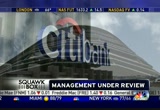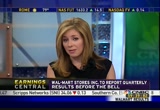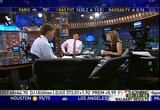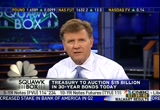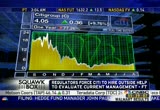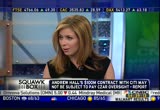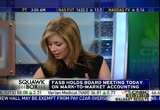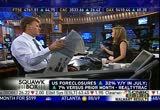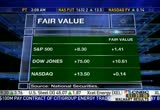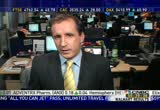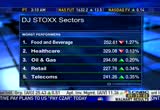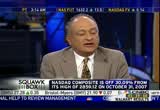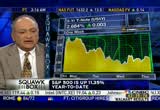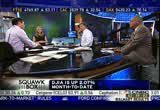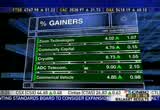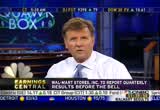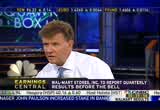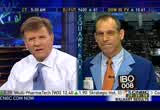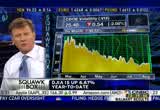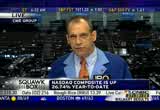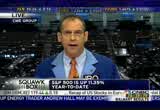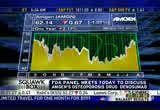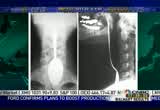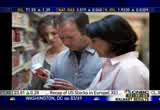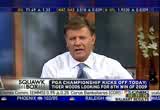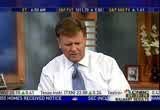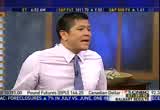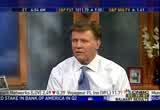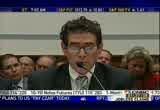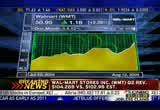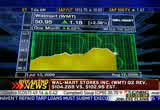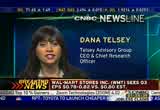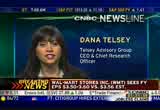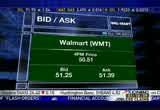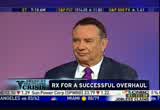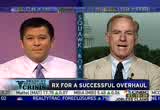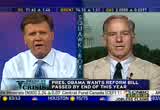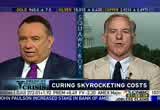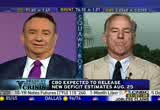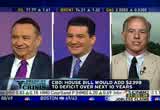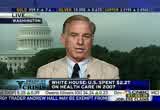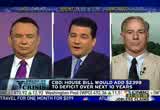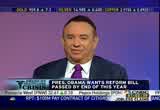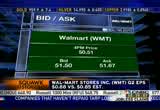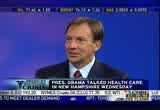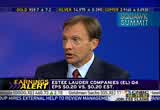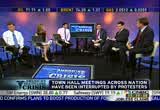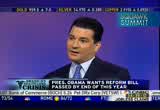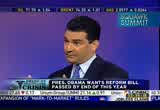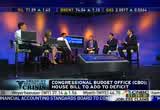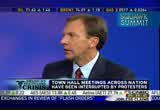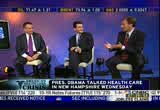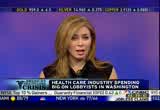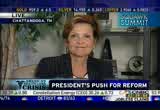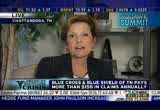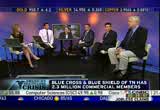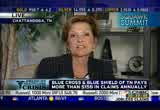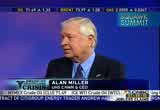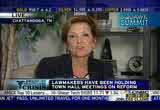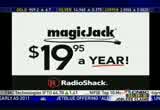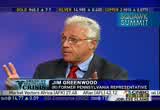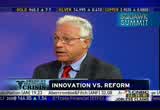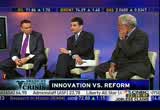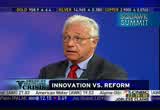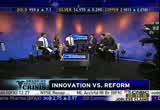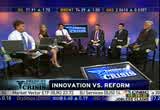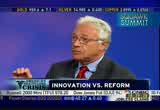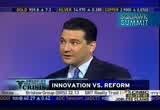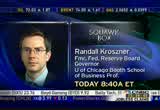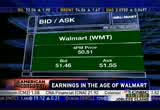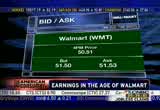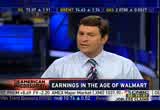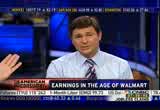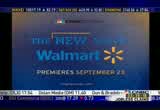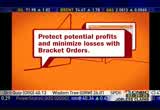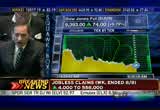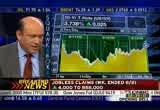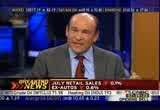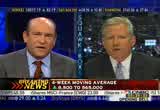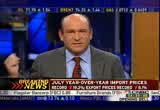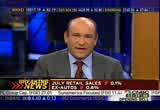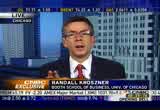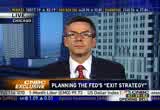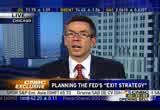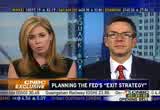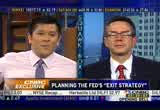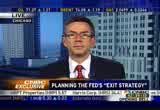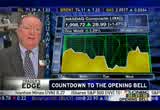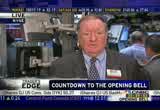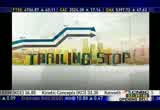tv Squawk Box CNBC August 13, 2009 6:00am-9:00am EDT
6:01 am
good morning. walmart is set to post quarterly results before the bell. foreclosed, a number of states particularly hard hit with foreclosures. and the u.s. government reportedly forcing citigroup to seek outside help to grade the bank's management as "squawk box" begins rights now. good morning, everybody, and welcome to "squawk box" here on cnbc. i'm becky quick along with joe kernen and carl quintanilla. economic bellwether walmart is
6:02 am
set to post quarterly results before the opening this morning. the retail giant is expected to earn 85 cents a share on nearly $130 billion revenue for the quarter. walmart has had strong performance and in his words would seize the moment to make even further strides with his business. but this is a more important number than usual. this is a huge bellwether for the entire retail industry, but we have not heard monthly sales reports from walmart. that leaves a few questions as to exactly what's happening. also on the docket we've got dr. pepper, snapple, auto desk and nordstrom. we'll hear about a lot of these consumer names today and try to get a feel for exactly what's happening with american shoppers. the thursdays every month where we hear from the retail stores have not been as exciting because you can't get a feel for
6:03 am
what's happening without hearing from walmart. >> is there a name? walmart, the seek well. we favored it so well with the documentary, it's a seek well. it's like home along ii. it's like the net world did so well, let's do it again. >> if that is harry potter, he is daniel radcliffe, right? he's looking older, maybe a little too old. >> he's got a b on his -- for brain. you're making me voldimore, aren't you? >> no. >> in addition those t earnings numbers, we'll get the government's retail sales data at 8:30 eastern. forecasters expect overall sales in july rose 0.8%. but if he strip out autos, and that's key, the number falls to 0.1%. at the heart of the retail story, the employment picture, weekly jobless claims at 8:30 and economists see claims
6:04 am
falling by 5,000 to 545. continuing claims expected to rise by 69,000. given the conflewence of all those numbers, the importance of the consumer, we're rolling out special coverage today. we're calling it the american consumer, discount fashion. we'll ask who is profiting as the country has gone down market. we're going to have this coverage all day today right here on cnbc. >> i like the bar codes. >> yeah. >> another day, another major treasury auction. the fed announced it would wind down purchases of government debt. that didn't derail the markets heading to -- remember the journal said they would be unlikely to -- they didn't say it, but people questioning whether there will be any more highs in 2009.
6:05 am
meanwhile, i saw veringi on with larry. they had ardenni and lazlow on. 1,700 on the s&p from lazlow. new bull market. no one really believes it, everybody is waiting for a way to get in. tech is going to do well, financials. 1,700. >> by when? >> two or three years, three or four years. it's another 70%. ka ching. ka ching. >> you're going to go out and start spending that money right now. >> did you ever see the commercial with the guy who is like parnett, he goes ka ching. he's invented his own -- he makes this move, i made $3 billion, ka ching. i'm giving him some free advertising. in corporate headlines -- there it is. in corporate headlines, regulators forcing citigroup to hire outside help to determine if current management is up to leading the bank through this crisis.
6:06 am
the ft reports the company has hired a headhunter, consult askant firm egun gender to carry out a management review after the government's stress test. citigroup must present a plan to the board. the plan may incorporate managerial changes. bank of america is said to be carrying out a similar review internally. citigroup tells cnbc it had no comment on the record. >> not surprising. an upside consultant to -- >> to come in and see? >> we're good, right? >> bring them in. we'll ignore everything. >> bring them on. don't ever say -- bring them on or mission accomplished, please, don't say that. >> tell is the deadline for those companies with outstanding t.a.r.p. loan toes submit executive pay xankz compensation
6:07 am
plans to ken feinberg. trader andrew hall, his $100 million contract with citi has been in the headlines a lot lately. now hall's contract may not be subject to pay czar's oversight because it was signed before february 11th. but another source says feinberg still has plenty of flexibility, using his authority on a case-by-case basis. that's the big question, will he get his money? will that unit stick around at citigroup and -- >> or is he grandfathered in? >> but if he doesn't stick around at citigroup, it's a big question, too. this guy is a big rainmaker. >> did they call him? >> there was a report the other day that they had called him to see if he was interested, they called him and he made a bid and apparently they didn't go with it. >> fasb is reportedly holding a board meeting today to discuss a proposal that financial
6:08 am
instruments be carried at fair value on balance sheets. no immediate action is expected on that proposal. if there's eventually a change in the mark-to-market rule, it could impact earnings. john paulson has been buying goalman, bac -- >> yesterday he took about 168 million shares of bank of america in the second quarter and he became the bank's fourth largest shareholder. that helped out shares in bank of america. he bought about 14.9 million capital shares of bank one financial and he reported new holdings in other national regional banks, too. region's football one of them. 1.5 million shares of state street and about 5 million shares of fifth third. >> that's all right. >> yep. meanwhile, the foreclosures in u.s. hopes homes, rising 32% year over year in july, that was up 7% from the prior month.
6:09 am
there's new stats out from realty track today. california, florida, arizona, nevada made up almost 57% of the country's total foreclosure activity. >> just in those states alone. >> do we have chairs today? i may do it in chairs. >> yes, we do. >> vegas? >> no, no, these are truly rest belt type things. cleveland, michigan. >> is warren in there? >> buffalo, scranton, scranton, pennsylvania. dayton, ohio, north of -- >> why dayton? >> just sort of rust belt, you know, people -- the population is going down, not going up. junctiontown, springfield, mass. places that in the past were
6:10 am
manufacturing meccas, whatever. >> industrial. >> industrial. maybe they were making the parts. >> they met to talk about what the heck we can -- >> what are we going to do? >> yeah. >> markets today look pretty good. europe is in good shape. did you guys see gdp out of france and germany? up 0.3, better than expected. the recession is over in germany and france. that's giving people a lot of good vibes this morning. oil has returned. the reflation trade is up today. the data yesterday was pretty bearish. ten-year note hasn't really gone to the moon after the fed meeting. 3731, the pred between the two and the ten wider this morning. dollar, the old trade, joe, back in place. dollar is down against the euro
6:11 am
and the pound. 1.4266 against the euro and then with a weaker dollar, has gold managed to eek out a gain? 6 bucks or so to $959.10. overseas this morning, let's talk to christine tan in singapore but first to london. an interesting morning with martin baccardax. >> interesting, indeed, carl. a lot of us are questioning the assumptions about the growth stories after these surprise numbers out of france and germany. it must be remembered that they have done this with a very small amount of fiscal stimulus. both governments were reluctant to spend that much even in the case of germany an election in september. i think it's remarkable now that we have such a swing in expansion. one robin does not a spring mistake. we don't know if this is a trend that is going to pull all the economies out. and the whole of the euro zone did contract by 0.1% in the same period. so the lagger ed around the edge are bringing down the engine room. still, the numbers are pretty
6:12 am
impressive and that's led to the positive tone we have in equities across the board. 0.9% on the ftse 100. we haven't seen those incident tra day numbers since august of last year. there's a real concern for equities. basic resources doing well. the dollar is weaker, the euro is well bid, therefore, commodity prices are rising and that's lifted basic auto stocks. it has to be said, some of the defenses note doing so well, but only two sectors are in negative territory. i mentioned the bund future because by and large, that's been selling off for most of the mortgage on better than anticipated reading out of france and germany. but again, i was to the reit ral, $1.3 trillion, it does make us wonder which tactic is the
6:13 am
best. i'll send you to christine in singapore. >> hey, martin. we didn't get much of a chance here in asia to react from the gdp numbers coming out from germany and france. but you know what? those upbeat economies from france, in terms of financials, technology, consumer related stocks, those did well. in japan, the nikkei 225 edged up 0.8%. we had relief about the u.s. economy and that sent export sensitive shares higher. those gains on wall street helped to propel the hong kong market higher 2.1% pushing it ever so closer to the key 120 level. some investors were concerned. others taking a wait with and say attitude. banks led the gains on optimism of an economic recovery. that's it from asia. carl, let me hand it back to you. >> christine, thank you for that.
6:14 am
christine tan joining us from singapore. let's see how the u.s. markets are shaping up this morning. peter canello joins us here on set, as usual, and anthony chan from jpmorgan's private wealth management. antho anthony, let me get your take on the european numbers. martin brought up the point that they did it at a slightly different monetary and fiscal strategy. are we at a point now where the monetary systems don'tny to be caved and kolgded? >> carl, i think at this point we're seeing positive global economic activity. you've got to take into context nos numbers out of germany and france. we are likely to start to see stronger numbers for the united states, both in the third and fourth quarter. so those are nice numbers, but certainly not as strong as what we're likely to see in the united states and in the third and fourth quarters. that doesn't mean that the economy he don't need some coddling. if it doesn't get coddling, then of course, a w-shaped kind of economy is always the risk.
6:15 am
>> and so in light of that, what was your take on what the fed said yesterday, leveling out, it's been said this morning tha there was sort of something in there for everybody. the end of october, but still letting the program go, the buyback program go. >> well, all they did with the buyback program with regard to treasuries is basically slow it down by 30 days. they still kept it intact. again, i think it's more of a signal to suggest perhaps they don't need to extend it any further. remember that the treasury buying program is still only a fraction of what they're doing with regard to the mortgage backed securities. so they're still adding quite a significant amount of quantitative easing that is still in the pipeline. >> yeah. and so, peter, the bullish calls continue, right? joe, i don't know if you herd them at the top talking about -- was it barini's call for 1,700 in a matter of years? >> on the s&p. right. i think there's about 460 billion more in mortgage-backed securities to purchase. mortgage interest rates are below aaa rates.
6:16 am
the fed is still easing. the economy has bottomed. we've seen that in unemployment claims. we've seen that in a bottoming in the housing market, in housing prices. and we've seen that in manufacturing, the orders have surged. the fed has to slow down a little bit, but they're not going to -- >> they can't take their foot off the gas completely. >> no, no, they're not going the tighten it until we've seen at least two quarters of rising gdp and an improvement in the unemployment. >> why is -- although joblessness is shrinking or moderating, why is the idea that commercial credit, right, all the things that continue to come back and haunt us, the echo of the credit crisis, why are those things not as top of mind as they were a few months ago, then? >> well, that's a pretty normal thing. you know, the commercial real estate market doesn't recover for some time after a recovery.
6:17 am
sometimes as much as 6 or 12 months. i don't think that is a major problem. probably i'm more concerned about credit card debt, bank herbings, things like that. >> anthony, what number out of retail sales would convince you that these inventories will be met with some sort of demand? >> i like to see the control numbers come in stronger. >> by that, you mean ex autos, right? >> ex autos, ex gasoline, those three components taken out. i like to see those numbers coming in a little more positive. at this point, the consensus is looking to a flattish number. the cash for clunkers program is a great stimulus program but we need to see that broaden out into other areas. >> do you believe that the cash for clunkers has a halo effect in that it gets consumers used to taking their wallet out
6:18 am
again? >> i really do because if you see people booilg buying new cars, it's likely to make people more excited about buying a new sweater or a new suit or perhaps even a new set of golf clubs. these have to get started somewhere. >> does that mean -- retailers have had a good run here, peter. what's the strategy in terms of consumer exposed sectors? >> well, i think first of all, retailers have more to go. technology is one of the core leaders here. >> upside, you mean? >> upside. and i think health care has to be -- you know, i think people have been a little too bearish. >> i think that will be moderated. i think there will be some control. but i think the prices are very, very reasonable.
6:19 am
>> last night, there was concern, if everything is on one side and there's no checks and balances, suddenly the democrats control both houses and the executive branch, there still is gridlock. how is there gridlock? >> there was an argument over the weekend that you would almost want a tepid recovery because politician eps would be less popular, less able to force through major policy and force investors to have to think of all these exit strategies. >> i think there would be moderation on cap and tax. >> was that freudian? >> it was a slip. >> anthony, do you go along with that? will you have to consider policy changes less in the second half of next year and certainly, how could you do more, right? the first half was historic.
6:20 am
>> well, i think we will see a moderation just as the central bank has said it's going to be moderating. as the economy recovers, you'll see less noise with respect to a second stimulus package and you'll have to look at the numbers because if the economy is growing rapidly, which i don't expect, but if it's just bursting at the seams, then i think there will be a little bit more pressure to be a little bit more aggressive on the policy front in terms of the programs that are going to be proposed. to some extent, if it's a tepid recovery, those things have to be scaled back. all right ooef you've seen some of that. the economy is recovering from a fragile point of view. >> i don't know. it seems like even the idea that government was more on the way out than on the way in would feed confidence among investors. not to say that we shouldn't be grateful for what they've done or that they're not still doing
6:21 am
good work, but that could be a change in the psychology of the market, i think. anthony, thanks for your time. good to see you, as always. >> coming up, the nasdaq and the big board squaring off. who is winning the popularity contest with the listings companies? we'll have the answer for you right after this. é (announcer) illness doesn't care where you live... ...or if you're already sick... ...or if you lose your job. your health insurance shouldn't either. so let's fix health care. if everyone's covered, we can make health care as affordable as possible. and the words "pre-existing condition"
6:22 am
6:24 am
right now we're talking about dow futures higher by about 68 points above fair value. today we have plenty of information on the way. walmart's earnings are expected. we're thinking those will come out in just over half an hour's time. nyse euro nex winning the battle with nasdaq so far this year. data from thompson reuters shows a lead of 11 to 4. the bigboard said to be benefiting from a decision to loosen listing requirements. there is a multi year marketing
6:25 am
alliance that presents marketing change. >> solder winds. a big board -- i mean, you think big board, you think a certain size, a certain quality. you don't think quite as speculative. >> interesting that they've relaxed their listing requirements. >> you think profitable. >> you think blue chips. >> bluer, anyway. and then nasdaq, you don't necessarily think pink sheets, obviously, but you think nasdaq, sort of, and i think a lot lines are getting blurred now, aren't they? >> they are. >> the first earthquake i was ever in changed my view. it was a reset. >> it was. >> like i rebooted. >> do that again. >> i rebeated. first i sat there for a while
6:26 am
and then i finally tart staed to come up. i had to hit f1 and hook up windows if you want to continue. >> we could turn you off. that would be actually really neat. >> you can restart me. i need to be railroad started once in a while. >> anyway, coming up, we'll have more of this morning's top stories. we'll have the picture from the futures pits. we are approaching 6:30 on the east coast. that's 3:30 for you early west coast risers that are up with us. we love you. "squawk box" will be right back. i'm racing cross country in this small sidecar, but i've still got room for the internet. with my new netbook from at&t. with its built-in 3g network, it's fast and small, so it goes places other laptops can't. i'm bill kurtis, and wherever i go, i've got plenty of room for the internet. and the nation's fastest 3g network. gun it, mick.
6:27 am
(announcer) sign up today and get a netbook for $199.99 after mail-in rebate. with built-in access to the nation's fastest 3g network. only from at&t. the gold delta skymiles credit card... from american express... it's the official card... of the world's largest airline. and it's the only credit card... that earns miles on delta. miles that take you... to more places than ever before. over 350 destinations worldwide. so switch today. get up to 25,000 bonus miles-- good for a free flight. call now to apply. there's no annual fee for the first year... and you can redeem... with no blackout dates or seat restrictions. these are just a few of the benefits... of carrying the official card of delta air lines. switch now and you can earn miles... on delta with your purchases: groceries, gas, entertainment, and more. get up to 25,000 bonus miles... with the gold delta skymiles credit card. call 1-800-skymiles to apply.
6:28 am
this is the official card... of the world's largest airline. hi, may i help you? yes, i hear progressive has lots of discounts on car insurance. can i get in on that? are you a safe driver? yes. discount! do you own a home? yes. discount! are you going to buy online? yes! discount! isn't getting discounts great? yes! there's no discount for agreeing with me. yeah, i got carried away. happens to me all the time. helping you save money -- now, that's progressive. call or click today.
6:30 am
♪ >> caddie shack. good morning, welcome back to "squawk box" here on cnbc. i'm joe kernen along with becky quick and carl quintanilla. economic bellwether walmart set to post quarterly results before the opening bell this morning. the retail giant expected to earn 85 cents a share on revenue. i think the revenue numbers should be fascinating. will it hit $103 billion? at the company's annual meeting last month, ceo mike duke said walmart has had strong performance, but -- and in his words would seize the moment to make further strides with its business and i think he means
6:31 am
market share and trying to take things away from other people, basically, but with low prices. >> and going green. >> yeah. >> they've got that new index that measures the green -- >> signing on for health care reform. >> they are facing head winds, though. >> oh, yeah. as we recover, maybe you go up to target. ojp penny. >> you don't have the stimulus from a year ago, so tough comps, more foreclosures and oil prices have climbed. >> in the meantime, futures looking pretty good. world stocks are up. rash >> and futures here in the states after the fed yesterday said that the economy in their words is leveling out. the dow, of course, broke that two-day losing streak yesterday. and the s&p reclaimed 1,000. oil is higher, as well, as france and germany came out with positive gdp growth in the second quarter. the recession is now officially over in france and in germany.
6:32 am
71.52 on the ten-year contract. still hovering just under 3.25%. the dollar, the loser today versus the pound. and with the weaker dollar, gold is higher by about 6 bucks in change. .at last check, 6.10, to $958.60. >> now to the cme, dave bahoric is standing by. dave, these auctions, how would you grade the ones that we've seen in the last month? better than people thought? worse than people thought? i mean, the market has been able to go up in the face of these, so they haven't been that bad, i guess. >> luke warm at best, i would say, joe. and the market understands that there will be a lot more auctions forthcoming. for example, yesterday you had the ten-year that was out ahead of the federal budget and then the fed announcement. i don't know how -- what kind of appetite that you would have stepping into that auction in
6:33 am
this environment knowing those two announcements are right after you've done your business. luke warm at best, joe. >> but the markets, dave, i made the point yesterday that the equity markets, i would hope that traders, when they finally decide that the fed is going to end some of this stuff, which we got an indication of yesterday, and when they finally decide rates will go up, i was hoping the knee jerk reaction won't be, uh-oh, rates are going up, we need to sell equities. aren't we hoping rates eventually go up to understand indicate that the planet is recovering and we are recovering? >> absolutely. there is a delicate balance with that adjustment and you're probably, right the first knee jerk reaction will be to sell off and that's where trade comes in and price discovery and those kinds of good things that we continually talk about and you'll see volatility and you'll see trade.
6:34 am
but you will see that 70% of the market rallying and it will be good news if the balance is struck properly. the rhythm that this market has had the last, say, six or seven sessions, is a -- kind of a getting beat up in the morning a little bit, a little bit of an ebb and flow and then a firming in the afternoon and strengthening and trying to hang on to that ten handle. we believe that the market will keep this type of rhythm until we press 1020 and then we'll see what happens. the rhythm is going to change and the trade is going to change. it's been very difficult down here to trade. it's spotty. there's been some good, solid buying, but all of a sudden, the market drys up for periods of time and it leaves traders just hanging out there with positions and nowhere to go. >> well, that late afternoon trading was mentioned, as i say yesterday by these bullish individuals that kudlow had on as being indicative of the idea that the train is leaving, i've
6:35 am
missed 40 or 50%. i keep waiting for a tradeback, so i'd better get in now, even if it's at 1,000 on the s&p, i need to get in. >> well, it's a concern that we had and we had this conversation months ago and it was the inserting of the microprocessor into this whole mix. the marketplace is a lot different now than it was two years ago. with this microprocessor, you're finding it bush one way or the other. that could very well be the answer for the marketplace we're seeing here. >> dave, thank you. good luck trying to figure it out. >> if i may, yesterday was my son's 14th birthday. identities he's headed to lyola academy web started football practice and he got a new mac laptop. what a great day. >> he's going to high school, college prep, is that it? >> absolutely. >> then that st a reason to
6:36 am
celebrate, david. don't let him get jugged too often. >> no, we won't. >> justice under god. >> working on the floor, justice under god out there. >> detention, carl. >> really? >> jug, jug. see you later. >> take care. in corporate headlines, an fda panel meets on whether to approve a crucial osteo pro sis job for amgen. the company wants denosumab approved as a treatment for osteo per row sis. earlier this week, the fda said that patients taking denosumab were more likely -- i guess that part -- >> yeah. >> in any event, they believe that it cures infections of the skin, ear and unionary tract better than patients taking a
6:37 am
placebo. >> do you want to try? >> nice. you're like the -- >> i don't know how to say it. but whenever i come across it -- -- they do it on purpose. some of the names, the syllables don't even fit to go on these things. >> the mab, i got. >> remember when exxon tried to name itself and every other word in the english language, every combination was taken? >> and we named some -- in uggo, didn't it mean flat ewe lens in some language? it's hard to name something globally. >> like nova, the car nova. it means won't go in spanish. >> so exxon with two xs. first time anyone ever put two xs together. >> european publisher is reportedly proposing google's book scanning settlement. that oinl affects book rights in this company. but the fc says book publishers fear it will result in losing
6:38 am
rights to european works in u.s. university libraries. i can read this if you've got -- >> no, i think this is wrong. anyway, sony -- not this. something i'm reading here for chairs. are we doing chairs? sony will adopt an open for mets, for e-books. the company will make an announcement today. they plan to use adobe's anti-copying software seen ago an attempt to counter some of the growing marketing power from amazon with its kindle advice which carl was using on the train. >> i got one for judy when she was on bed rest. >> and you stole it.7 >> and you liked it. >> how does it download the words and -- >> we liked it but we didn't like that you completely ignored us on the 3 1/2 hour train ride back. we thought you were in a bad mood. you ignored us. >> i did? >> you sat in front of us. >> we didn't really talk to each other, either. >> well, if he had been there,
6:39 am
we would have talked to each other. >> next time we'll be in the same chair. >> ted coppel watts looking at us saying, they talk all morning and -- oh, you're up. >> russia is starting its own cash for clunkers program. they plan to offer car buyers a $1,5550 rebate. the cars have to be more than ten years old. get this. the rebate can only be spent on russian made cars. cars by ford, renault, nissan, they will all be eligible because they have factories in russia. this program, though, is expected to be launched early next year. but this is a more nationalistic take than the program we've seen here in the united states. >> it's amazing how it's morphed from country to country. if you've got any comments or questions, drop us a line. we will take a quick break, get some news making headlines outside the world of business when we come right back.
6:41 am
6:43 am
time now for a check on the world outside the world of business. >> good morning. i have a picture of the day for you. it will have you talking. i'm saving it for last, of course. >> good. >> we'll start in washington, though. 16 people gathered at the white house on wednesday to accept the nation's highest civilian honor.
6:44 am
the honorees included senator ted kennedy, tennis legend billie jean king. the scottish government is considering an early prison release for a former libban agent convicted in the locker bombing which killed 37 people. abdel masset is serving a life sentence and has terminal cancer and would be released on compassionate grounds. here it is, your picture of the day. take a look at that x-ray. this guy accidentally balance lowed a spoon. he says he had a fish bone stuck in his thrown so he went after it with that spoon. and then somehow swallowed the spoon. >> i know an old lady who swallowed a spider -- >> doctors were able to surgically remove it without any complications. but the best part of the story is when you read through and read the notes from the emergency room. the man presented to the emergency department with
6:45 am
difficulty swallowing and a cough. monica, i know i'll probably ge@ in trouble with this, but give us an idea which part of the country this was. do you have a state where this happened? >> this comes from the new england journal of medicine and this is a 57-year-old egyptian man. >> so we don't know where it was, really? >> no. it was in egypt. >> oh, it was in egypt? >> yeah. doctors were at manseura university. >> oh, good. then i'm not going to get in trouble. who would stick a spoon down their -- >> when you have a bone in your throat -- >> you stick a spoon down there? >> let me get that fish bone for you. >> carl, come on, that is like -- >> and look at the size of that spoon. that's a significant -- now, wait, here is what's even more fascinating. so the google swallowed spoon to try to get more information on this story and the first thing that pops up is another story of a woman two years ago who swallowed a spoon in a laughing
6:46 am
fit while she was eating spaghetti. i mean, you can't make this stuff up. >> that's great. well, not great, but glad everything worked out. >> but actually, in her case, they said the doctors rigged some sort of lasso thing so she didn't have to have surgery. they had to put her under, but they were able to pull it out. this guy had to go through surgery. >> i guess you can't pass that. >> can't get through your -- >> that many be next week's story. >> are you okay in there? i'm fine. >> all right. >> good morning. happy breakfast. >> thank you. all right. bye-bye. >> see you tomorrow. let's take another look at the futures this hour. we have watched the futures higher all morning. right now, futures are up by about 71 points. as carl point the out earlier, both germany and france have seen the official end of the recession with growth in their latest gdp numbers. that's got the markets higher around the globe this morning. coming up, you'll hear all about it. we have been coming through the papers. we'll have the talkers of the morning right after this 37.
6:47 am
>> and later -- >> tdd#: 1-800-345-2550 if i'm breathing, i'm thinking about trading. tdd#: 1-800-345-2550 i always have my eye out for a stock on the move. tdd#: 1-800-345-2550 doesn't matter if a company sells computer chips tdd#: 1-800-345-2550 or, i don't know, fish and chips. tdd#: 1-800-345-2550 i'll look at all kinds of stocks before i settle on one. tdd#: 1-800-345-2550 if i think i'm onto something i'll check it out, tdd#: 1-800-345-2550 you know, see what other traders are up to. tdd#: 1-800-345-2550 when everything feels right though, tdd#: 1-800-345-2550 that's when i get serious. tdd#: 1-800-345-2550 and the minute i get into something, tdd#: 1-800-345-2550 i already know when i want to get out. tdd#: 1-800-345-2550 of course, every now and then i'll talk with somebody tdd#: 1-800-345-2550 who knows what i'm trying to do. tdd#: 1-800-345-2550 (announcer) switch to schwab today.
6:48 am
tdd#: 1-800-345-2550 you'll get the tools, the technology tdd#: 1-800-345-2550 and the support to trade your way. tdd#: 1-800-345-2550 go to schwab.com/trader tdd#: 1-800-345-2550 or call 1-800-540-7304 tdd#: 1-800-345-2550 right now. tdd#: 1-800-345-2550 but opportunities can vanish like that... tdd#: 1-800-345-2550 ...so most days, i'm right there tdd#: 1-800-345-2550 when the market opens.
6:49 am
i just want fewer pills and relief that lasts all day. take 2 extra strength tylenol every 4 to 6 hours?!? taking 8 pills a day... and if i take it for 10 days -- that's 80 pills. just 2 aleve can last all day. perfect. choose aleve and you can be taking four times... fewer pills than extra strength tylenol. just 2 aleve have the strength to relieve arthritis pain all day.
6:51 am
we are in chairs. tiger is like a two to one favorite to win the pga. all the subtle butt on espn yesterday was is it a successful year for tiger if he doesn't win a major? he's won seven tournaments, incredible performance overall for the year. keeps winning the tournaments before the major, so not winning the major. i think 80% of the people that polled said yes, it's a successful year. >> he's making his point. >> it's going to be at hazelteen. it brings up something i spoke about yesterday with john kerry trying to -- interesting legislation to make sure that no corporations sponsor any more golf tournaments if they had t.a.r.p. money. an assault on golf, not even close to the assault that was in the journal yesterday, chavez down in venezuela is closing down golf course webs nice golf courses there. i guess they were built by some western oil company that came down and maybe -- >> so they're ex pat's, maybe?
6:52 am
>> maybe. but the state department -- >> inbe. it's an elise it's sport and we'll put tent cities -- i don't know what he wants to do with it. it's part of his continuing -- am i allowed to say socialist now? i'm scared, carlos watson. great, carlos. the department of state, in thi country, this great guy crowley said, at the department of state, the -- and to chavez, i wish to protest the unwarranted attack by chavez on the game of golf. he's out of bound as is he on is is so many things. then he calls and says we're going to give mr. chavez a mulligan. he said the winner of the masters, built a public course in den kentucky at the british open. we watched a 59-year-old man
6:53 am
almost win -- >> tom watson. >> -- win a majors. the guy we're talking about is this -- tiger represents how many different nationalities and races and countries. i just thought it was nice that the state department -- >> they went out of their way -- >> didn't ask john kerry. wi windsurfing for everyone. >> it would have been better for his campaign if he had been seen golfing rather than the windsurfing. >> it was the full-body condom in the woody allen sleeper. >> no comment back? >> no, no, no. i wish i knew how to play golf. >> i wish i could, too. >> you should take us out. you should take us out and give us a couple of lessons, right? >> we could -- >> yeah. >> i seriously wish i knew how to play golf. >> do you know what golf stands for?
6:54 am
>> gentlemen only ladies forbidden. >> no, i would not fever say th >> i learn that from you. >> that's awful. strike that from the record. >> i learn that from you. what does it stand for? >> how many town halls can we watch where the death panels get all the attention, right? it's actually this provision in one of the house bills where medicare would be authorized to reimburse doctors who counsel patient on end of life if, in fact, the patients want it. it's been inflated to mean a lot more than that. it does point to american's fear about government, involved. the journal has a piece, why is this in there any way? it's a third of spending. the hope is if this were in place you wouldn't be doing the wasteful spending in the last year of life. >> it's impossible to talk about it. rum rahm emanuel has at least
6:55 am
rac raised the issue, you have someone with dementia than someone very active, do you treat them differently? someone that's disabled. whatever you want -- he's written about it. just because he's written about it or broached the subject, he has a lightning rod -- >> but it is one of the biggest fears people face, like the es kco co-eskimos, do you turn them f off? >> do you spend $150,000 per year on a drug that will prolong a term patient's life by six weeks? >> i don't know. do you spend $250,000 for a critical care patient for three weeks and -- in a trauma center when you know they have a very slight chance of recovering. >> do you put a defibrillator in
6:56 am
someone who's 90 -- >> when was terri schiavo, we made no progress on -- >> exactly. >> i think people fear the idea of a government bureaucrat would ever be in charge of the decisions rather than your doctor. >> government bureaucrat, i know that's redone de redone redunde fear it could under government auspices. >> we'll talk about politicians and hospitals and -- >> and people who represent big pharma. it's a very sticky question. i'm going to turn to a lighter subject. it's august. people start thinking about vacations. they start thinking about having house guests who come around. the new york times addresses this in their home section today. they address the idea of really
6:57 am
bad house guests. they are coming for you. look out, prepare president the people who will take advantage of you. i'm thinking about this because i'm going on my vacation to the beach in a few weeks. i invited my family, like i do every year. i think there's about 25, maybe 30 who will be showing up at this point. i'm really excited about it. >> that's a lot of people. >> there's a big turn out this year, which i'm excited about. but it does point out that vb has to pull their own weight. you have to make sure everybody cleans up, everybody does the dishes. >> in our family, they do. >> how long? >> for a week, a week. >> 25 to 30 people in one house? >> we have a few hotel rooms we've picked up as more people have come along. >> but during the day they're going to congregate at the house, right? >> it's not rented under my name so they can't figure out -- >> it's not going to be like a third world country, is it in. >> it's a really nice house with a pool.
6:58 am
>> what does quayle say about -- >> the name it's rented under. >> we're waiting on quarterly results from walmart. hot under the collar, americans fired up about the health care debate. look at that. politicians, physicians, the industry entry at the center of the storm, a "squawk box" summit up next.'m t looking for a bailo, just a good paying job. that's why i like this clean energy idea. now that works for our whole family. for the kids, a better environment. for my wife, who commutes, no more gettin' jerked around on gas prices... and for me, well, it wouldn't be so bad if this breadwinner brought home a little more bread. repower america. i hope our senators are listening. shopping online can help save.
6:59 am
doing it with bank of america can help save a lot more. up to 20% cash back from over 300 online retailers with our add it up program. just sign up and use your bank of america debit or credit card when you shop online. it's one of the many ways we make saving money in tough times a whole lot easier.
7:02 am
good morning. welcome back to "squawk" on cnbc. i'm carl quintanilla along with joe kernen and becky quick. we are awaiting earnings from walmart, which should be hitting any minute. last month ceo mike duke said walmart has had strong performance and in his words would seize the moment to make further strides with its business. expected to earn 85 cent a share on nearly $103 billion in revenue. we'll bring you those numbers as soon as we hit. a tenth of all retail, as becky mentioned. we don't don't know about the consumer until we hear from them. >> this time walmart stopped issuing monthly sales guidance so it leaves analysts with a much bigger hole to try to figure out. stocks around the world reacting positively after the fed hinted at signs of economic recovery yesterday. the nikkei rose 82 points overnight. hong kong's hang seng jumped 418 point, about a 2% move. and then european markets are up
7:03 am
at this hour as well. and the futures this morning looking pretty good. joe, we talked about how things are looking around the globe with gdp positive in france and germany, too. >> 95 point a couple days ago, down, led by the financials. snapped right back up yesterday. we were up as much as 170. >> that was a good feeling, right? >> yeah, it was. especially for people that are so ready to call a top -- or to call a correction. >> as "the journal" did already -- >> some of those guys are allowed to invest and aren't in. people that write articles like that -- it's just the nature of the markets, i guess, to try to leave as many people behind as they can. out. 8:30 eastern time we'll get retail sales for july. xhis expecting a 0.7% rice. factor out the cash for clunkers inspired auto sec sore, look for
7:04 am
a rise of 1.0%. we're looking for forecast of total 545,000 new filings, down 5,000 from a week ago. some corporate news, anheuser-busch imbev said the second half of the year would be significantly weaker. ft says citi has been forced by regulators to hire external consultants who will consider whether the company's current management is capable of leaving it out of the financial crisis. hedge fund manager john paulson who made a fortune betting against companies stocked up on shares of bank of america during the second quarter. a regulatory filing talks more about that. you got a walmart number? >> 88, three cents ahead of expectations. looking for third quarter, yeah, that's not -- third quarter, 78 to 82, which would be -- >> versus 80 cents estimate. >> $100 billion for sales.
7:05 am
>> a little shy of the estimate. >> 100.09. that probably is not that big of a surprise, i guess, given that that's what we've seen with everyone. higher bottom line and -- or higher than expected bottom line a lot of times -- >> i see second quarter sales rose 2.4% to 104? >> that may be. walmart stores sometimes break out sam's or exclude gasoline. but you see the other number, 100.08 -- >> net sales. where did they -- oh, the net sales for the quarter without the negative impacts from the currency exchange rate. i don't know what the -- >> then it's 100. >> right. >> so that might be -- we'll see if that is taken as a negative at this point. the bid/ask, at this point it is higher. let's get to someone who might know how to analyze this, dana
7:06 am
tell -- we do, but dana might be better, ceo and chief research officer of the telsye group. >> fluid in spanish. >> fluid in spanish. never says uh when she's talking. are revenues below expectations? >> right in line, 100.9, right in line. the earnings came in in at upper end of expectation. guidance, yes, certainly put a wider range on it. my sense is that, i mean, they still are the market share leader out there. that's definitely key for them. >> what were comps and how did they compare to expectations? >> that is exactly what i'm looking on for the release right now, as you're looking also, as the release just came out. >> okay. well, they do expect comps for
7:07 am
the 13-week period, august 1st to october 30th, to be flat to 2%. >> second quarter 1.5% u.s. >> yes. 1.2% total. >> and that's a down 1.2% total. that comp is light on expectations, 1% to 3% is what was looked for to be a negative comp. that is lighter than expectations. certainly compared to the first quarter when their first quarter comps were up around 3.7%. they were going up against a 4.3% comp in q2. the third quarter they're facing a -- a little over a 2% comp. >> you said, dana, that expected is they were looking for positive comps? >> yes, positive 1% to 3% comps in the quarter. >> that's no good. >> the conference call is going to start in a moment also. we'll get more color on that after the call. >> raises year view to 350 to 360, which is right where the street is at 3.56 anyway. >> right. it's right in line. one of the things we're seeing
7:08 am
is gross margins and sgna improvement is what's happening companies deliver a little better than expected bottom line numbers. >> dana, it almost looks like -- i'm looking at a tick by tick, i don't know if you have a monitor, initially went up. maybe everybody was looking for that comp number. >> that comp number was buried. it's usually up top. this time it was below commentary. >> the gross margin looks like it came in around 25.5%. that is a better than expected gross margin number. everyone's getting lower product costs. >> dana, how much more difficult does it make your job with walmart not handing out monthly sales number? >> overall you want to have the sales numbers but you do the feed on the street and we go to the stores all the time, you get to see what's happening. they've been the traffic share leaders. does it make the job more difficult? a little bit. stores, see what's happening. >> dana, reuters number for revenue was 103. are you saying it's in line -- i
7:09 am
mean, is it 103, does that include the currency or the gas or something? how come you say it's in line when it looks a couple billion light versus reuters? >> on the press releases that came out for the three months, and just in terms of what we've been looking at, 102 has been our number. >> okay. >> so 102 and 100.9, when you have such a big company like this, you'll have some tweaks. >> all right. close enough for government work. >> dana, overall is the dynamic the same as we heard from other retailers, margins did well but maybe the underlying traffic is still a concern? >> top overall same store sales continue to are pressured by price points. with lower product costs you're earning more profit on these and you're just -- you are, very careful on the expense side of the business. >> yeah. >> the reason i mentioned it, we just had on the lower third there, breaking news, we have 0
7:10 am
104. don't use 104. >> looks like the sg&a rate came in a little bit higher, but we should get more details on the call. >> yeah, and they do say they're going to accelerate, their words, accelerate focus on costs. future are at session highs. >> walmart called a little higher, 20 cents on the bid. >> they said same store sales for the third quarter are expected to be flat to 2%. so that would certainly be a little of an uptick from what they reported. >> even though down from what we were expecting before? >> right, right? >> they should know. >> hopefully they -- we started the quarter, and they have some back to school trends. >> it's going back up. thanks, dana. >> bye. the cfo point out as well, he says walmart remains strong financially, great access to capital markets and a aa rating,
7:11 am
plus one of the few dow 30 component ents so report a year off year earning report. something they don't normally hear. we'll have more on walmart throughout the day. we're kicking off cnbc's coverage of the american consumer. we're joined by two people who are keeping tabs on the mood at the mall and consumers' wallets. they see optimistic signs. here is citi retail analyst and retail analyst with piper jaffray. it's good to see both of you. jeff, why don't you tell me about what you see when it comes to consumers, are they getting ready, opening their wallets once again? >> we think they're just starting to open their wallets. it's interesting with the walmart news, still very much a trade down cycle going on out there, but we really think the consumer is starting to open their wallets. they're getting a lot of units for less dollars. so when sales results come out lower than expected with higher
7:12 am
margins, we think that's a classic sign of an inflexion sign and healthy to investors that profitability will accelerate. >> kim, people have been watching what's been happening with retail stocks, they're up 40%, and there's concern that stocks are getting ahead of consumer spending. >> my sector is up about 35% just in the last 5 1/2 weeks. so near term over the next four to eight weeks we could see them trade sideways. overall, what we're talking about is stocks that might look expensive on a pe basis but remember that "e" is depressed. operating margin has been under pressure for two years. we think as you see the earnings recovery valuation will not hold the stocks back. >> what stocks are the favorite in your sectors, kim? >> our top two picks, american eagle outfitters and urban outfitters. american eagle is down 1200 basis point. we see improving fashion in the
7:13 am
stores. we think that will continue through the end of the year. the margin recovery opportunity for them is substantial. urban outfitters, a very @ attractive long-term groit story, beating earnings this morning. we see improvement fashion execution at the stores and they're doing so much work on their supply chain. we think they're going to be one of the global leaders in supply chain speed to market. >> jeff, what are your favorite? >> we have two different strategies. one is the value strategy so kohl's and ross stores have been a favorite. we expect the consumer to continue to trade down. those stores are gaining shares from the closure of mervin in southern california. the consumer is going to remain focused on value but you have to have some skegsary in your portfolio. i also like american eagle outfitters. we also like for a little longer term abercrombie & fitch.
7:14 am
with their international stores opening we think margins will start to improve. >> kohl's just came out with earnings. they not only beat expectations by a penny and raised guidance for the full year. is that what you expect to see continue? >> absolutely. we expect them still to maintain a conservative outlook but given the momentum in q2 they beat their comp plan every month and beat their margin plan. they're getting more shares than they thought they would out of california. this is going to continue. more brand will take themselves out of traditional department stores and go into a place like kohl's because that's where the customer is. >> the consumer has gotten used to getting big discounts and sales when they go into the store. will they continue to shop if they don't get the big discounts and what will that mean for the retailer's bottom line? >> we think discounts are here to stay. during holiday 2008 the price discounting we saw at the mall was 50% to 70% off. what's working now is a 25% to 30% off.
7:15 am
with product cost deflation, lower sourcing cost, retailers can offset that discount. so, in fact, we're seeing a less severe discount right now. we think that will mean margin recovery going forward. >> kimberly, jeff, we would like to thank you for joining us. appreciate it. again, let's look at walmart. just reporting. as you can see, they came in with better than expected expectations. that stock's even jumped in the last minute or two as we've been watching this. the company came in with comp store sales a little below what the street was expecting. flat to two for the current quarter. that would show improvement over the past quarter. >> interesting because it's down from where they were for this quarter. it was disappointing, they were at one to three and they did minus 1.2 but to still say now we're flat 1 to 2. >> they must be seeing something with back to school sales already. >> you would think that's a positive comment. we're kicking off an hour-long "squawk" summit.
7:16 am
america's health care crisis. our guest is tommy thompson and former former fda commissioner dr. scott gotliev, joining us with stryker ceo steve mcmillon. oof! i hope he has that insurance. aflac! you really need it these days. how come? well if you're hurt and can't work it pays you cash... yeah to help with everyday bills like gas, the mortgage... ...and groceries. it's like insurance for daily living. so...what's it called? uhhhhh aflaaac!!!! oh yeah! that's it! aflac. we've got you under our wing. a-a-a-aflaaac!
7:19 am
this is a special presentation of "squawk box." america's health care crisis goes under the microscope. in the waiting room, howard dean, former hh and human services secretary tommy thompson, the ceo of blue cross and blue shield of tennessee, the ceo of universal health care services and the ceo of stryker. how an overhaul of america's health care system affects everything from company costs to a trip to the emergency room. who's paying for it? what about consumer protection? >> no, no, that's not true. >> these questions and more as our special "squawk box" summit "america's health care crisis" begins now. >> if you don't have health
7:20 am
insurance, will you finally have quality affordable options once we pass reform. welcome back to this special he edition of "squawk box." we are taking on the health care crisis head on and what it will take to cure it. our guest host, former health and human services secretary and presidential candidate tommy thompson, served in the bush administration. dr. scott gottlieb is a former fda commissioner, now an american enterprise fellow and with us former democratic candidate, howard dean, joining us from the nation's capital. governor, scott, good to see you, all of you. governor, let me begin with you, governor dean. since this debate began a few weeks ago, we've seen the poll numbers approving of it decline. we've seen the cbo say it's
7:21 am
going to cost money. this town hall video speaks for itself. as candidly as you can argue, is it losing political steam or is it not? >> i don't think it is. i think what you're seeing is a counterattack by the right with tons of misinformation. i saw the clip of the guy saying you're undermining the constitution, you're going to control everything. i have no idea what section of the bill says that -- >> the problem is there is no bill. it's hard to argue -- >> carl, there's absolutely a bill. there's a bill that passed three house committees and one senate committee. there's not a single bill that hasn't been merged yet -- >> that's my point. there's nothing to say what this policy will be -- >> oh, sure there is. if you look at all bills, the three committees in the house and senate, there's a good outline. nowhere does it say there's going to be death panels. nowhere does it say the gov's going to control everything. this is part of the political process. it has to be worked through and i think it will be. >> governor, do you think people like to hear that -- you know,
7:22 am
they're sleep, led to these conclusions that are -- you don't think any of these people had maybe some of these feelings before they were talked to by the republican operatives? don't you think that's a bad takt for your party to take, influenced by websites and -- you can see the backlash already. people don't want to hear that. these are people that might actually have their own thoughts and feelings about what's going on. >> i haven't heard anybody say -- well, maybe some people have said that. >> pelosi -- >> i don't agree with that. >> un-american people that are plants of the republican party. >> look. i don't think they're plants of the republican party. i do think they're fed a lot of misinformation by right wing talk show hosts, some foundat n foundations and businesses putting up money. that's beside the point, though. i think what these folks are mostly are people who never
7:23 am
liked -- >> howard, that's not beside the point. you democrats are always coming out and accusing the right wing as doing all this problems and causing all this confusion when the truth of the matter is claire mccaskill said today on television this is not a right wing conspiracy. these are individual citizens that really have a concern. and i -- >> tommy, i don't think -- >> i take hum bridge when you play the republicans and right wing. >> i think the republicans have to own up for this. >> republicans don't have to own up on it because the republicans are not behind it. >> they're putting out memos encouraging people to shout down congressmen. that's a fact. i have it right here on my blackberry. >> the truth of the matter is, the bill is bad. >> the intil a good bill. >> people are concerned about it. they're coming out because they don't like what they read, what they hear. >> governor -- >> what they're hearing and reading is simply not true. that's the problem. >> that's -- >> governor dean, people are reading the bill. the bill is out. you have the congressional bills, the senate legislation --
7:24 am
>> where does it say -- >> they're reading it and that's why the approval ratings in this legislation are suffering. >> where does it say in the bill there's a death panel? >> the bill -- >> who's writing talk points? i didn't say there was a death panel in the bill. >> this is nonsense. >> this is not nonsense. the bill says there are panels set up to advise people about end of life. >> if they would like it. >> if they would like it. but that's what the bill says. >> government's going to -- >> that's what the bill says, howard. >> don't say it doesn't say it. >> her baby would have been killed by obama's death penalty, that's luke chris. ludicrous. >> you can't say it doesn't put power in the hands of government officials to make -- >> that is hogwash. that's -- i practiced addition i practice medicine. that is absolutely nonsense. complete garbage right now. >> i have section of the bill in front of me. i have the bill right in front of me so -- >> i suggest you read it. you tell me exactly what seconds
7:25 am
of the bill it says the government will make medical decisions. >> one section that evidently you haven't read on who can be -- >> i would like to hear it. >> -- be put back into hospitals and who can't, adpord cording to a formula. >> that exists today in medicare. this is about giving people the choice over 65 -- >> you cannot sell this. that's what the people are saying. >> i'm the only person here that has practiced medicine. i've never had a medicare bureaucrat tell me what i can do -- >> i worked at medicare. government officials are intruding in those decisions. the bottom line is american people are reading this bill and -- >> you are making it no better than rush limbaugh with all of this nonsense. that's just hogwash. >> governor -- >> all the republicans have made this stuff up, week after week
7:26 am
you make this up. it's nonsense. >> governor -- >> i can explain it to you, if you would like to. >> i can explain it to you, but you won't listen. >> because there's nothing -- you are making stuff up. >> you're making it up. it's a bad product. you've got a bad product. >> this bill works and you guys are -- >> you're attacking everybody. >> you guys are in the insurance industry. that's the problem. >> the republicans are supporting the insurance industry. democrats are trying to support the american people. that's how how it is. >> the house bill will get a lot of heat because it's on paper. people can point to it. that's not going to become law. so why hasn't the president come out, will he eventually say, look, when this goes to committee, to conference, when it's put together by the house and senate, this is central, this will become law in my own personal view. why hasn't he done that? >> i think he is doing that.
7:27 am
>> clearly not because we're all arguing about the house bill, which is not going to be final. >> the president has made it clear, one, he wants a public option. two, he wants to give people a choice. you can keep your insurance if you like it. if you like, it you should keep it. >> which is an excellent point. >> how can he make that claim, how can the government enforce any employer into keeping the coverage that's currently in place? >> he doesn't force employers to do that. most employers want to do that. i was at a ceo meeting, 96% of them want to keep their employer-based system. >> today. >> today. under obama's plan they can do that. >> we've had employers on our program we've asked them, point-blank f a public option becomes law, would you send your workers into that? and they can't unapologetically say no. >> let's assume they do for a moment. let's assume they do. >> they fight with the post
7:28 am
office. >> the worker still gets the choice between a public option or a private sector option. this does not eliminate private health insurance. it's another misconception by right wing talk radio. >> there you go again. you accuse the right wing. >> it's true. tommy, you've represented to rush limbaugh. >> these are independent groups looking at this bill saying that it's going to crowd out private insurance over time. that's the goal. when i talk to honest democrats on capitol hill staff, and i spend a lot of time up there, they admit the end game and the long-term goal is to crowd out private insurance. >> that is crap. i don't know anybody associated with this bill that wants to do that. >> private insurance will remain in this country for the wealth and privileged. >> that is such nonsense. that is totally ridiculous. the fact of the matter is this -- let me finish my example that carl brought up. if you -- if your employer decides they're going to dump people off their employment rolls, which, by the way, small businesses will not have to pay any more for this, they be then
7:29 am
the employee has a choice. they can use their government subsidy to buy private health shuns or public health insurance. that's a fact. >> until they're closure on this we'll continue to invite you on to defend the policy. we hope you'll come back after a spirited 15 minutes. governor dean -- >> i hope you give me a chance to finish my sentence. >> you came out and started attacking, howard. >> it's hogwash, is a complete sense. >> some people don't like it. >> the truth of the matter is we need health care reform. we should sit down and get a bipartisan bill. that's what we need. >> you practice internal medicine? >> yes, i do. >> we do have a practicing physician. >> i take that back. >> drop us a note at squawk@cnbc.com. are you ready to see the e-mails flood in, becky? >> watching already. >> when we come back, ceo stryker, maker of surgical products will join us to talk about what health care reform means for his business. steve macmillan in a moment. ( siren blaring )
7:30 am
special interest groups are trying to block progress on health care reform, derailing the debate with myths and scare tactics. desperately trying to stop you from discovering that reform won't hurt medicare. it will actually strengthen it by eliminating billions of dollars in waste and lowering drug prices. tell congress not to let myths get in the way of fixing what's broken with health care. learn the facts at healthactionnow.org. so now we've turned her toffee into a business. my goal was to take an idea and make it happen. i'm janet long and i formed my toffee company through legalzoom. i never really thought i would make money doing what i love. robert shapiro: we created legalzoom to help people start their business and launch their dreams. go to legalzoom.com today and make your business dream a reality. at legalzoom.com we put the law on your side.
7:33 am
box," everybody. let's take a look at the markets right now. we are watching the futures well above fair value this morning. right now you're talking about the dow futures up by about 91 points above fair value. this comes after we saw some gains in europe. germany and france are oe fiblly out of the recession, according to their latest gdp numbers. that got things started off this morning. then we heard from walmart. walmart is called higher after the world's biggest retail beat expectations with the latest earnings. walmart came in with numbers of 88 cents a share, three cent better. the bid/ask is well above fair value. they said this time around for the current quarter you'll look at comp store sales flat to up 2%. that's helped things out. realty track says home foreclosures rose by 7% in july from june and 32% up from a year earlier. four states account for the bulk of those, california, arizona,
7:34 am
nevada and florida. joe, back over to you. >> thanks. we're continuing our special "squawk" summit on america's health care. do you guys call it a crisis, tommy? >> we do. >> there's systematic problems. >> while reform could mean larger volume for medical technology firms, our next guest is worried the haste we're seeing in the legislative process could lead to unintended consequences in the long run. joining us now, we haven't seen him in a while, the ceo of stryker, steve macmillan. what do you sense? thank you for coming in today. it's good to get your viewpoint on someone that run a company, stryker, at the forefront of a lot of joint replacements and some people would think optional procedures at times. not usually? >> i wouldn't call them as much optional. usually the time someone is getting a new hip or knee they've been in pain for a long time. >> even in recession they put things off, aren't they? >> a little bit. only so long you'll put
7:35 am
something on with debilitating pain and limitations in your life. >> the plans, talked about, either the house plan, the senate plan, finance plan, what do you see there that you like and that you don't like? >> when you step back from it all, i think we have to remember, the american health care system has many of the best elements of the world. there are many people, when you think about the cleveland clinics, mayo clinics, md anderson, hospitals for special surgery, there are so many people from around the world that come to this country for great care. i think as a country we ought to think about it as a xetdtive advantage for a long term having the beth health care system in the world can be a great asset for us as a country. there are some commonsense reforms some people agree on. electronic medical records, the need to address chronic diseases. i think what's happened here, universal coverage, which makes a lot of sense, but it morphed into comprehensive health care reform instead of taking pieces and buckets. an analogy, we passed a $787
7:36 am
billion stimulus early this year. throw everything at it very quickly, moved quickly. little elements of that are probably doing really well. the $2 billion for cash for clunkers is probably doing really well. so should we break health care down into the discreet buckets? instead of trying to do everything overnight, sxing that's what the american -- >> steve, if we did this, there would be bipartisan support. chronic illness, disease management, and wellness, both democrats and republicans put that in their party platforms. electronic medical records, everybody likes that. if you broke it down, you could get a bipartisan bill with republicans and democrats and people around the country would rally behind it. but forcing a public plan and forcing too much into it gets everybody confused because nobody understands it, everybody's getting mad. we may end up not passing anything. >> one point, he cited some
7:37 am
examples of what the private market is is doing in terms of reforming how they play for health care. we look at the cleveland clinic, other private plans, they're doing things medicare wants to do but can't do. instead of paying physicians individually they pay for episodes of care. if you have heart failure, doctors get treated for treating heart failure. i worked at medicare. they can't even track an ep owed of care. so they can't reform the payments the way the private market's doing. the more you centralize these things the more you get inefficiencies and how things get reimbursed. all the xamps you cite are private market efforts. >> is it salacious -- is it fallacious to say that the administration or the far left is trying to move us to single payor, to some type of government-run plan, or is it not? you know, that's the worry. that's the thing that -- >> not everybody, joe, on the
7:38 am
democratic side wants a public plan or a one payor system. but individual leadership -- speaker pelosi, chairman waxman -- >> the president? >> i think the president want a public plan. >> why does he keep saying, if you like your plan, you can keep it. >> you can't keep it. >> why does he keep saying it? >> i don't know. >> what you're going to see employers are going to make decisions to move their beneficiaries into the public plan. it will be cheaper. they'll have to do it as a business decision. private insurance will xis in this country for -- for the wealthy, privileged, people who can wrap around a public option with private insurance. if you look at canada right now, they have a public plan and it's starting to crumble and you're starting to see a private insurance market grow. you'll see the vast majority of americans forced into the government plan because they won't be able to pay for their way out of it. one of the ironies is everyone who's debating this and working
7:39 am
on this legislation will never be subject to these rules. governor, he'll pay his way out of it. >> those who think a public plan is the way to go, they don't have to be ashameded -- >> they don't have to be asha d ashameded. >> and other people who show up at town hall meeting, they're angry and show up -- >> but the only way to get control of these spending issues and inefficiencieinefficiencies not adept to make these kind of decisions. that's agitating to people in town hall meetings. the idea that a remote government official will be making these clinical decisions. you want the decisions to be made as close to the provision of care as possible. whether the local doctor or health care plan making those decisions. >> the disappointing part of this debate is i think the public option has become an enormous distraction and is clearly gavel nizing so much of
7:40 am
the american public because they're working about that. that's not what the president campaigned on, which was a talk about universal coverage. we have to take this great system in this country, but get more people access to it. >> how do you get universal coverage without a public plan? >> you can give people subsidies -- >> yes. >> we should be able to come up with a uniquely american system. by the way, i've lived in a public system. i lived in the uk for 3 1/2 years. there are a lot of problems with those systems, too. people that always think there's one system that's perfect, no systems are perfect. we ought to be taking american creativity and inbegin newgenui put it up for bid and you would have -- >> every time i say what about state pools, they say that happened with blue cross blue shield and it didn't work. >> you can pool around any kind of place where people come together. the central issue is do we move to a defined benefit or defined
7:41 am
contribution? does the government provide people with with a defined set of health care benefits and tell them what they can or can't have or do they give them a pot of money and allow them to purchase plans to suit their needs? >> is rt part of that requiring people to hold health care insurance? like you're required -- >> you can't force americans to purchase health care insurance. people aren't going to bike it because it's not an economically -- >> why can't we force people? if we force people to hold driver's insurance why can't we force them to hold health insurance -- >> when you get in an accident they hurt the other driver so there's a public good there. >> if you are sick and show up at a hospital, we'll take care of you -- >> it's a financial burden. >> supporters will argue, look, the reason the backlash against this is so strong, at least publicly, is because it's scary. it's big change. that's how historic legislation happens. it's massive change '60s
7:42 am
medicare, in the '30s social security. is there something wrong with that argument? >> i would just caution that we need a smart approach. i give a lot of credit, frankly, to what senators grassley and baucus are doing, trying to get into the nitty gritty and go through the issues. this can be so complex to try to ram everything through so quickly. if we do this in steps over the next couple of years, that should be an enormous victory. that if obama -- you know, if at the end of a first term were to leave office with a -- or, you know, continue on, but having made major strides but whether it has to be done -- the artificial deadline of do do it before the recess, when there's so much at stake here, clearly just doesn't -- >> i want to bring up -- >> you want to be smart. i give credit to the senate finance panel and the founding marries of this country who set it up to try to have different people look at stuff rather than do stuff in a week that have --
7:43 am
>> through reconciliation. >> stryker has been very far reaching and innovative on new hips and joints and so on, so forth. and we have about 75% of the new drugs are really designed and developed here in the united states. we have a great thing here. of having new products. this is something i've been concerned about. i'd like to have your comments as to whether or not you think this new health care reform bill could in any way harm the ingnnuity? >> it certainly could. the american health care system is on the leading edge. this is where people come from the middle east, from other countries to get the best health care in the world. that's driven a lot by the medical technology that we offer. if you think about even the medical technology industry, we're about 6% of the entire cost of the health care system. and yet i think a very visible part of why the u.s. is out in front of the rest of the world, because of the innovationings
7:44 am
we've developed. i do worry the countries in europe, as they crunch down, they drove medical innovation offshore. that's why so much is concentrated here. it's been a big driver of the american economy as well. >> absolutely. >> as a ceo would you prefer to negotiate with a lot of individual private plans or negotiate with medicare? i get the sense big drug companies would rather negotiate with cms? >> and the reason for that, by the way, is because the private market is actually working. the private market is putting a lot of pressure on pricing. and on cost control. and i'm still a fundamental believer that the government should set the general -- the general road map and then let the competition fight it out. walmart fights it out with all the retailers, right? where there's competition, when the rules are set and clear and the government can lay that down and let it fight very well. you know, mayo and cleveland clinic, they compete with each other. and have inspired a higher level
7:45 am
of care, as you well know, more than just a government. >> thanks. we want further than we wanted to, but i think we got a lot. it's uft we have to say good bye to you. >> sure. thank you. >> back with earnings next up. >> thank you. >> are you going to -- >> okay. let's talk a little more about health care companies. they have poured millions into health care reform. drugmakers, doctors, insurance, they have been lobbingy for months. pharmaceutical research and manufacturers, $6.1 million. pfizer, $6.5 million. american medical association, close to $4 million. elilily, $3.6 million. amgen, $3.4 million. a lot on the line. when we come back, a closer look at how hospitals and insurance companies are thinking about reform and whether the president's town hall meetings are working across america. we'll talk to ceos of united
7:46 am
7:47 am
7:48 am
to more places than ever before. over 350 destinations worldwide. so switch today. get up to 25,000 bonus miles-- good for a free flight. call now to apply. there's no annual fee for the first year... and you can redeem... with no blackout dates or seat restrictions. these are just a few of the benefits... of carrying the official card of delta air lines. switch now and you can earn miles... on delta with your purchases: groceries, gas, entertainment, and more. get up to 25,000 bonus miles... with the gold delta skymiles credit card. call 1-800-skymiles to apply. this is the official card... of the world's largest airline. health care companies that deny them coverage or drop their
7:49 am
coverage or charge fees they can't afford for care that they desperately need. i believe the wrong. it is bankrupting families and businesses, and that's why we are going to pass health insurance reform in 2009. the president's push for health care reform continues this week with three town halls on this very subject this week. but what are the unintended consequences from reform like this to insurers and to hospital care. joining us with their speck perspective, vickie gregg of blue cross blue shield of tennessee, and universal health care services, which is a hospital company as well. vickie, i would like to ask you about the insurers in this process. they've been painted as villains and nancy pelosi said just that, the insurers are the villains. how do you respond to that? >> well, i think it's important to understand that the insurer, more than three years ago, began
7:50 am
talking about changes that needed to occur in the marketplace. most specifically, looking at guaranteed issue, where people could have access to health insurance, where they wouldn't be subject to preexisting conditions. we coupled that with the need for rating reforms to make sure that it becomes affordable for people. we also began to push forward the idea of subsidies for people to help them to be able to afford it. so all of these things we've we've been talking about now for better than three years. in fact, our company, if you look at our history, we began really looking at this back in 1994 with the implementation of pin care in our state. i think the industry has recognized the problem and are very much willing to step up and dress them. >> what do you think about the bill that has passed the house at this point? >> well, i think that, you know, it's still uncertain to me some
7:51 am
of what the intention is. fundamentally it looks at some things we look at what is important, the guaranteed issue, the removal of preexisting conditions. it allows for subsidies. we do have concern around the public plan and how that might play out, but all in all, i would say that there are a lot of things that are in that bill that we ain agreement with. >> alan, you run over 100 hospitals, you see this every day on the front lines. what are your concerns? >> my major concern is, well, a few things. first off, the public option to me is a two-part situation where you wind up with socialized medicine. i can't imagine that an employer, who is offered a lower priced and a higher priced coverage, would not go to the lower price. what happens at that point, the estimates are that of the 171 million people covered by employer insurance, 120 or so will go into the public option.
7:52 am
it makes sense. so you really don't have a competeding public option. you have a public option financed by the government, charging a lower rate. and then normally people will move and all business decisions will go that way. ultimately what happens is you wind up with insurance companies that can't be viable. >> it's impossible to tell the future, right? we don't know what employers are going to do. governor dean said 96% of employers in his poll said they wouldn't transfer workers to the government option. isn't there the argument, if you want to retain workers, you'll keep the best insurance? >> it seems to be -- >> carl -- >> -- from a business decision what will happen is if you have a cost of $12,000 for a family or $5,000, you will move to the $5,000. now, you may have a supplemental, you may have various other things, but there are 1300 insurance companies now competing. we don't need another competitor
7:53 am
who doesn't play by the same rules. >> vickie? >> oh, remember the -- >> i think it's -- >> oh, please. >> i think it's important from our perspective, this is actually played out in our state over the course of the last 15 years. back in 1994 when we implemented tin care, it essentially was a public plan people could go into and be subsidized. we saw people made rational choices and over the course of two to three years we saw that that program, which up until then had had about 12% of the population, medicaid eligible, expand to 25% of the population. it was growing. so if you have a plan, it's in particular in that situation the tin care program had access to the access rate, artificial pricing in the marketplaces and people made rational decisions. >> although, it ran into real problems, right? it ran into funding problems. >> absolutely. >> what's going to happen is the
7:54 am
public plan will get up and running, it will build a mass of people, people will move into public plan. initially it will be a good set of benefits. you start to see medical inflation go up, it will become restrictive, at the level of the federal government, the last place you want restrictions imposed on what you can or can't access. >> it will suffocate itself over time, is what you're saying? >> like medicaid. >> you wind up with rationing. all you have to do is look at uk and canada. the president talked about canada as something to emulate. lately he's talked about canada as, 33 million people, we can't really deal like that. canada's off -- >> people are ignoring medicaid. medicaid is what we're heading with medicare. >> vickie, i cut you off on your last point. >> well, i was just going to say, you know, what we saw is that the program grew. eventually became the most expensive medicaid program in the country.
7:55 am
it was a combination of both the medical trend as well as the increasing numbers of the population that went into the program and the combination of the two was simply unsustainable. what happened was that we began to try to look at the benefits, but every time we tried to touch the benefits, which were very rich, they were medicaid benefits, we found ourselves running into lawsuits where, you know, essentially people were saying, when tn care was enacted we would have all of these benefits and you can't take them away. it's important to understand that once you give something to a population, it's very hard to take it away. once you get people into these kind of programs, it's hard to reverse course. so taking this very slowly one step at a time and learning some lessons from the past, is important. >> all right. thank you very much for your time again. vickie gregg, the ceo of blue cross and blue shield of tennessee and alan miller, chairman of universal health services new still to come, former pennsylvania representative jim greenwood,
7:58 am
7:59 am
lower and higher again. we'll be back with more "squawk." >> keel come back with our "squawk" summit. fithe same tools the pros use, so you can be a disciplined trader. by selecting from eight advanced triggers, your order gets executed, even when you're busy. and with trailing stops to help you lock in profits and minimize risk, you can be confident in your strategy, no matter which way the market moves. find out why more and more active traders are turning to fidelity for a smarter way to trade online. trade like a pro. trade with fidelity.
8:00 am
finally, good news for people with type 2 diabetes or at risk for diabetes. introducing new nutrisystem d, the clinically tested program for losing weight and reducing blood sugar. hi i'm mike, and i lost 100 pounds on nutrisystem d when i was first diagnosed with diabetes, that first step was more like a giant leap.
8:01 am
till i discovered nutrisystem d. in a clinical study people on nutrisystem d lost 16 times more weight and reduced their blood sugar 5 times more than those on a hospital-directed plan. plus a1c was reduced .9%. choose from over 140 menu options, there is no counting carbs, calories or points. i lost 100 lbs. and lowered my blood sugar level. nutrisystem d changed my life. mike is one of many who have lost weight and controlled their diabetes with new nutrisystem d. backed by 35 years of research and low glycemic index science nutrisystem d works. satisfaction guaranteed or your money back! new! nutrisystem d. lose weight. live better. call or click today.
8:02 am
this is a special presentation of "squawk box." trading america's health care crisis. >> health care for all! health care for all! >> who's going to pay. >> this hour, where innovation and new drugs fit in. >> what is truly scary, what is truly risky is if we do nothing. >> the health of american consumer, ready to spend or just tapped out? walmart results are in. find out if shoppers are running to the king of all retail for recession relief. more breaking news on jobs. the jobless claims report at 8:30 a.m. eastern. just one topic to tackle with former fed governor randy kroszner. "squawk box" begins right now. welcome back to "squawk" here on cnbc, first in business
8:03 am
worldwide. i'm carl quintanilla along with joe kernen and becky quick. we'll get back to our health care sum knit mitt in a moment. first, headlines ahead of key jobless claims and retail sales. futures are well above fair value. we'll talk more about that in a bit. walmart, 88 cents a share for the latest quarter, three cents ahead of estimates. however, ceo ask say u.s. comp store sales did not meet expectations during the quarter. walmart poised to open higher this morning. here's a look at the bid/ask, up almost about 80 cent or so. fellow retailer kohl's earned 70 cents a share. nordstrom will be out with numbers this afternoon. regulatorsing citi to hire outside help to find out if current management is up to leading the bank through the cries. the ft says the retained head hunter consultant will carry out an independent management recrew after the government stress test. citi must present a plan to the gored before posting q3 results.
8:04 am
bank of america, also said to be carrying out a similar review internally. citi has no comment on that report. finally, today's the deadline for those companies with outstanding t.a.r.p. loans to submit executive comp information to t.a.r.p. czar. then he'll have 60 days to accept those proposal few let's get back to "squawk" summit, america's health care crisis with joe and becky. >> thanks, carl. a new guest with us now, former -- or actually tommy's been with us, former health and human services, tommy thompson. thunderstormer deputy fda commissioner scott gottlieb. new guest, jim greenwood, running the largest biotech organization, former congressman from pennsylvania. i guess i'll call you congressman. how are you? >> jim. >> jim, good to see you. >> from what i can tell, correct me if i'm wrong, biotech got a pretty good deal, a lot of what
8:05 am
you wanted. 12-year exclusivity. when we say the ama signed off, big pharma signed off on it, there's the notion you were bought off. were you bought off? glo no. >> how did you get 12 years? why exclude biotechnology from the cost pressures everyone else has to live under? >> we certainly didn't get bought off. we weren't in the gang of six or so, whatever you call them, that went to the white house. we did our own thing. we've spent 3 1/2 years working on this biosimilars, carefully explaining to one member of congress at a time explaining what the science is -- >> does that work? >> it actually works. >> you're kidding. >> i went up on the hill with a plastic model of a aspirin is said this is a small molecule, i took a dvd player, this is a molecule of epo, this is how you make this, this is how you make that. we want to have competition from the generic companies but you have to make sure patients are safe. and you have to, above all else,
8:06 am
make sure the incentive for innovation remain. but we thought we needed 12 to 14 years after our products were approved before the generics can come in and use our data that we pay hundreds of millions of dollar to gather clinical data. in and that kind of a system would work. you get competition but still the inventives to invest in what are the most breakthrough, promising, amazing drugs of the future. >> but you're still in a position where you're open to a lot of criticism. >> true. >> when you look at what avastin cost or some cancer treatment that might show an increased survival of six months, going to cost $150,000 a year. doesn't -- it just seems like you're a poster child for the exorbitant cost of treatment and maybe some costs we shouldn't be undertaking, you know, we have to judge where to spend the money.
8:07 am
>> some products are very expensive, to question about that. they're extraordinarily expensive to manufacturer. they cost $400 to $500 million to build a plan to manufacture it. most of the products we try to created fail, so you have to build all of those costs in it. in fact, we do want competition. competition will bring these prices down. we're not afraid of competition. but if you -- if the competition comes too soon, then what happens is, no one will invest in -- the billions of dollars it takes to make a new drug and there won't be anything for the generic companies to copy at the end of the day anyway. >> do you have evidence for that in europe? has there been a loss of innovation in europe because of things maybe, you know, not protecting patents? >> well, in space. the europeans used to control the biotechnology world. they used to lead in innovation and biotechnology. >> and the pharmaceutical industry. >> and what has happened over time, because of their price controls, because they have put
8:08 am
so much of their focus on squeezing out the profitability of these companies in order to pay for their public system, there's been little left to invest in innovation. people don't want to invest in those companies. and so it's moved here. >> 50% to 60% of the drugs used to be produced over in europe. now the research and -- about 75% to 80% is does in america. that shows what a free enterprise system will do to encourage new innovation. >> many elements on so-called generic biologics. i spent a lot of time on capitol hill and the biotech industry won this debate so far on the merits of the argument, people on capitol hill care. real innovation is coming out of the biotech sector. farm s . >> you know, and i will tell u you, a lot of people anticipated that we would fight competition. that that logical thing for us
8:09 am
to do, and that's what the pharmaceutical industry did in 1984. we said, we aren't going to do that. we can't maintain our credibility -- >> how is 1-year exclusivity not fighting competition? >> no competition means we don't have a bill. we say, our strategy could are been, let's block a bill, we'll have no competition forever. we didn't take that way. we said, bring it on. it's based on really sound data done by -- in peer-reviewed published articles on how long it takes to recover the investment you make in these products. at the end of the day, if we don't have that -- i mean, what we're talking about is no more diabetes. we're talking about no more parkinson's, no more alzheimer's, one day maybe no more cancer. those reality will come true because of biotechnology. if you invest in it. >> it's the metaphor for health care delivery because people would like to separate the
8:10 am
profit motive completely from health care but this is an example of how a profit motive is essential to raise private capital to get the work done that eventually results in -- >> and it's high-risk capital. >> one thing to remember is the average patent life on a small molecule drug is about 12 years, more than 12 years. so the idea of a drug, protected for 12 years isn't extraordinary. >> but people point to that as one of the main reasons why -- i mean, the drug companies are on a poster child for what's wrong with certain parts of this argument in terms of it raking in huge profits and spending it on advertisements and add-on drugs they call long lasting and -- >> look, we spend -- the american taxpayers spend $30 million on antiaging. it doesn't make drugs. it makes good, academic papers. then we rely on my 1250 biotech companies to try to take that bake knowledge and turn it into something that prevents a couple
8:11 am
from having to bury its child, that prevent somebody forgetting who his wife is because of his alzheimer's, okay? that only happens if the american taxpayer, whether it's a mutual fund or some day trader says, i'm going to put my money into this. i want to bet on this. and i keep telling all my liberal friends in the congress, if you want to cure all these diseases and you say you do, you're for stem cell research and so forth, don't you want this industry to be the biggest private sector, at risk capital money magnet in the world? >> jim, there's another problem people are overlooking. it takes about $1 billion, about 12 years to get a drug, smal molecule, to the marketplace. now, i think we should be attacking that. trying to find a way to get our research done quicker, get the approval process done and be able to hold done that $1 billion, $200 million of research before -- >> before it gets to the fda? >> well, the regulation has
8:12 am
driven the cost. there's notice request about that in terms of the size of the cl clinical trial. there was an interesting analyses in the current issue of "nature" that makes the argument that the rate of return on drugs is less than the cost of capital. that can't continue. they can't be spending more on investing in a few drug than they're getting on return. i've seen analysis done that show some pharmaceutical companies would be better shutting off operation and spending out existing revenue in terms of a dividend. >> there's assault on the whole notion of for-profit health care. i'll tell you what people will say also, you talk about innovation, and our outcomes are worse, you'll hear, from the people that want -- you know, health reform, are worse than anywhere else in the world, where they spend much less money on it. >> that's not a function of these advanced biologics. these are cutting edge.
8:13 am
you want access, we're for that. you want quality, you want cost control. the fourth thing is innovation. people forget about that in this debate. they forget about innovation. they're willing to squeeze it out with price controls. it's innovation -- >> can't the government innovate? >> the government cannot innovate. when is the government ever innovated successfully? i mean, the government can spur innovation. that's why i pointed to anti-age. it spurs research that leads to private sector innovation. but it's innovation -- >> people would say darpa created the internet, right? >> i mean, government can innovate. we went to the moon -- the private sector didn't send us to the moon? >> actually, it did. it wasn't bureaucratic that built the rocks. >> when you say spur innovation, you mean government money, right? you're not talking about creating rules. >> that's the distinction i'm trying to make. government can spur innovation. it can incentivize innovation. it's at-risk capital that actually makes the bets on
8:14 am
what's going to work and what's not -- >> nih has $30 billion budget, and 80% of that money goes to universities, to researchers, foundations to do the research. that really is the stimulus to encourage innovation. government can do it and does a very good job of it. >> think how much less health care will cost when you dramatically reduce the incidence of these terrible, chronic diseases, which is what this biotechnology innovation is focused on doing. if you have less cancer, less card oe vafk disease, less alzheimer's, less diabetes for sure, and so many of our companies are working on these things, then you have real prevention because you're actually using the miracles of what we learn from dna and genetics actually fighting these diseases at the genetic level. >> when you look at the overall cost of health care, 75% of the cost of health care goes to chronic illness and about 12% of the $2.4 billion goes for medicines.
8:15 am
so it's really -- when you look at the overall universe of health care, the amount of cost of prekripgss and biologic is quite small compared to the overall cost of health care. >> a lot of waste is in the delivery of services. what the government seeks to do is regulate the things they can regulate, which is the pricing and the accessibility of medical product. it's easier to regulate the introduction of a product rather than tell every physician what they can or can't do. >> i think we're going. you guys can't stay. we have other stuff. wish we could. >> we started out with a bang and we're sort of ending up -- >> certainly did. governor thompson -- >> it's like a town hall meeting. and no one planted anyone here and yet it still cot ak -- i'm o
8:16 am
rat all you guys. no, i'm not. governor thompson, scott, congressman greenwood, thank you for taking part. i might report you as well. >> i thought you were fishing before we started talking. >> you did. coming up, the age of walmart. the king of all retail releasing its earning report about an hour ago. david faber will tell us how the numbers stack up. breaking news with a "squawk" exclusive, former fed governor randy kroese er kroszn is talking about the fed's exit strategy. randy kroszner will be with us.
8:19 am
welcome back. walmart out with second quarter earnings an hour ago. shares up over 11% since the recession officially began in december of 2007. with us this morning, our very own david faber, who has been looking into the numbers and a whole lot number. what do you think of the numbers. >> they look fine. they say they came in toward the top end of the rage.
8:20 am
i think the stock will be up. cost cutting helped at walmart. the company has been benefiting, becky, from a broader part of the population looking to save money. given these very difficult economic times. walmart has been benefitting from that, no doubt about it. that, said, you know, you're still not talking about incredible amounts of growth or anything year over year. >> are you downgreating it or something? do you have a buy on it? we're asking you. how are the numbers. >> they're fine. they're fine. >> do you have a price target? >> no. >> but the numbers are -- >> you're really -- just causing trouble? >> yeah, i am. you said the numbers were fine -- >> down 9700, joe? >> it's coming. 1700 on the s&p. >> give me a date. >> before some of us are dead. i'm going to ask you -- >> no, i'm not -- >> i know you're not. just the way youed the numbers are fine. you knew that was coming. >> well --
8:21 am
>> i set him up. i said, how do the numbers look. >> but you're not price cutting? >> you know, $100 billion in the quarter, revenues were less flat -- or decrease from a year ago. foreign sales very important, 25% of overall sales now come from foreign operations. the key markets, the uk, canada, mexico, japan, brazil and china, where i recently was. but they also suffer currency effects there, especially over the weakening dollar. >> $4 billion or something? >> exchange rate reduced shares by four cents. the outlook walmart gave, what investors are seizing on this morning, is a positive. >> the comp store sales were a little concerning, a little below what analysts expected but the guidance for the current quarter was a little better. >> because if you were forecasting flat to up three, and you do down 1.2, you figure
8:22 am
for the next quarter you might say, oh, down one, but they didn't. they stuck with the flat -- not flat to three but flat to two. it looks like this was an outliar they are neglects ive same store sales this quarter. the stock seemed to go up after that forecast came out for flat to two. >> yeah. they had benefitted from improvements that have been made in the stores. they've repositioned the real tailer. they've reduced the risers in stores so you have better sight line, changed the color palette and it seems to have an impact on them attracting more customers. the key, women, the majority of shoppers. >> i've spent some time in some of these stores. i check things out. they've been doing things in the store where they put a nice wood floor where the apparel sections are. that use toad be something only department stores would do to try to fool you into, better
8:23 am
places. you've spent a lot of time there. >> eye been spending a good amount of time, five years -- >> five years later. some of your cooler stuff was over in china. you went back to do it again. have things changed the way business is done in china? >> things keep getting big i and bigger. when we were there originally walmart was opening its 39th store. now they have well more than 250 stores. i spent a lot of time there with doug mcmillon, who runs all of international, which on its own would be one of the larger companies in the country, but not to mention the world with over $100 billion in sales. china, certainly very important for the company at this point. given the opportunity they believe they have to continue to grow there with 7 million chinese customers a week shop atwat walma walmart. >> you had great video of the -- sort of the rah-rah stuff that
8:24 am
goes on the meetings. the company seemed to dodge the pr nightmare. they don't handle it. they're not the poster child for everything that's wrong. >> that's the focus of our new documentary "the new age of walmart". >> because this is a sequel -- remember godfather ii was -- >> or die hard 2. >> or alien. >> in this case they're comparing it to g2. >> we got to do a lot of thinks we didn't get to do the first time. inside the company, different ways. as you say, the company has changed but it also remains the same. it's just interesting to see what these last five years have brought in terms of the changes -- >> how long does the first one run? >> it's impossible -- glo 100.
8:25 am
100. >> did they ask for residuals this time? >> who's "they"? >> walmart. >> oh, walmart. i asked for residuals. >> did they ask for a cut? >> they begged us to stop running it. >> so you need -- >> that is what ultimately resulted in the sequel. >> we'll stop running it if you let us come back. >> did it win an emmy? you won a script. >> it was a good program. we're very proud of it, as we are some of our long form offerings at cnbc, which run every night now from 9:00 to 11:00. >> we should point out -- thanks for, here. make sure you tune in on september 23rd when david's latest special will be airing "the new age of walmart." tune in, make sure you watch it. >> with david faber. look at that. >> yeah, i like that. >> thanks, david. coming up, breaking economic news, jobless claims and the government's resale sales report at 8:30 eastern time.
8:26 am
8:28 am
8:29 am
tdd#: 1-800-345-2550 i always have my eye out for a stock on the move. tdd#: 1-800-345-2550 doesn't matter if a company sells computer chips tdd#: 1-800-345-2550 or, i don't know, fish and chips. tdd#: 1-800-345-2550 i'll look at all kinds of stocks before i settle on one. tdd#: 1-800-345-2550 if i think i'm onto something i'll check it out, tdd#: 1-800-345-2550 you know, see what other traders are up to. tdd#: 1-800-345-2550 when everything feels right though, tdd#: 1-800-345-2550 that's when i get serious. tdd#: 1-800-345-2550 and the minute i get into something, tdd#: 1-800-345-2550 i already know when i want to get out. tdd#: 1-800-345-2550 of course, every now and then i'll talk with somebody tdd#: 1-800-345-2550 who knows what i'm trying to do. tdd#: 1-800-345-2550 (announcer) switch to schwab today. tdd#: 1-800-345-2550 you'll get the tools, the technology tdd#: 1-800-345-2550 and the support to trade your way. tdd#: 1-800-345-2550 go to schwab.com/trader tdd#: 1-800-345-2550 or call 1-800-540-7304 tdd#: 1-800-345-2550 right now. tdd#: 1-800-345-2550 but opportunities can vanish like that... tdd#: 1-800-345-2550 ...so most days, i'm right there tdd#: 1-800-345-2550 when the market opens.
8:31 am
8:32 am
steve liesman's in the studio. rick, are you more interested in jobless claims or what this retail number may tell us? >> i think i'm interested in both but i'm not sure i believe claims. i haven't seen good research to dismiss the notion of people are falling out of the system. but nonetheless, here we are. 558,000 on initial. down -- excuse me, up 4,000 from a revised 554,000. continuing claims, moved lower from a higher revision, from 6.34 to 6.2. on the surface, those aren't bad. retail sales, down 0.1 on headline inspect is not good. if you look at ex-autos, a fair way to look at, it it's down 0.6. and gas is down 0.4. import prices, you know they have moved. month over month, down 0.7. year over year down 1. i thi
8:33 am
i think retail sales is what we have to look at. they have mod ralted a bit. pre-opening equities, as treasury prices go up, equities are going down taking away some early gains. back to you. >> rick, stick around. let's have more discussion on this. scott nations is standing by at the cme. steve liesman is with us on the set. steve, i heard you grownan a couple times. >> i did not like the jobless claims number at all. i was hoping for more improvement there. these numbers are still consistent with declines in payropa payro payro payroll. i do like the continuing claims number. a couple problems with retail but overall a negative number again. it did not seem to pick up as much as economists had estimated in terms of the gains in auto sales. you've got a 2.4% gain, so that's going to affect the top line number, why it was minus 0.1. some economists were looking for
8:34 am
a 6% gain because of cash for clunkers. >> cash for clunkers was only around for -- you're talking about july numbers. >> that's true. >> you're talking about some crunches that got put through because there were problems in the first few days and -- >> i don't know why -- i don't know why, becky, economists would have dialed into such high numbers for auto sales but they did. we have seen this in the past, the difference between the unit sales by the auto industry and those picked up by the government. it tends to work itself out over time. that said, looking inside the numbers i see a lot of negatives. furniture down, of course. electronic stores down. building materials down. food and beverage down. it's a widely negative number. gasoline station sales were down with that decline in gasoline prices in the month of july. so this would suggest -- i'd be careful to take this over a two-month period. i want to see july and august. there was one comment out there from lou crandell who points out
8:35 am
the back to school are coming later this year, more like early august than late july. that could affect the seasonals a little bit. i'd like to see the july/august taken together. overall the initial read is less resilient or less spending consumer than we hoped for. >> scott, these are some of the first weak economic numbers we have seen in quite a while. to this point everything was pointing to improvement, maybe a bottoming out process. how tentative are gains in the market right now? we're seeing a pullback on the initial knee-jerk reaction but over the course of the next few hours, how is the floor going to digest these numbers? >> for today, i think that the resale sales number is going to be most important. and couple that with some of what we heard from walmart. for example, disappointing comp store sales. that undoes all the good we saw coming out of europe based on their output numbers. so as far as today is concerned, it's -- i think it's going to end up, a wash.
8:36 am
we had good news yesterday and the market reacted well, but we're also going to start thinking -- you guys just alluded to this, how is the fed going to start undoing what they have done. look at the vichx, still at 25. given where the s&p is, 25 is showing really healthy skepticism about the market. it's still overbought. that also has to get unwound. so i wouldn't be surprised if we're sideways for a while. >> scott, the issue becomes whether or not the market is priced for sort of a straight-line type recovery and for all the data to come in consistly good. i can tell you from experience in knowing the data that when we come out of downturns like we are right now, the data is never always clear. there are going to be ups and downs like this. right now the picture is kind of fuzzy. looks like a better bet we're coming out of recession but not a straight line out. that's the way the market is priced, it's going to be disappointing from time to time. >> scott and steve, i have a question. if i look at continuing claims,
8:37 am
a drop of 141,000, i'm sorry, but the only way to -- you know, as a noneconomist trying to look at this, it seems to me people are falling out. system. how can you explain such a big drop? >> i don't know that people are falling out of the system. i'll just be real broef here, scott. >> time is running out. >> i don't that's the reason. >> i don't either. >> i can find that out. i don't know if that's the reason. i do know in previous weeks the continuing claims numbers were affected by the same seasonal problems that the jobless claims had. and this number is seen as, much truer number of the -- truer picture of the state of the jobless market. rick, good question. i promise to follow occupy that. >> and i think rick is probably right, that people are dropping out. if we look back at the most recent earning season, i think people missed on the top line or met what was expected on the bottom line. what's the way to do that? the only way to do that is to
8:38 am
cut expenses. one of the -- >> one of the biggest expenses people cut is people. >> the fed yesterday gave itself a little breathing room when it extended the octoberings and said we'll reassess at this point. give us more time to collect more data. >> exactly. it can add more money later, not end the program. i also think it didn't feel like the market was ready to go on its own without the fed. it want to wind it down a little more slowly. i will point out that some economists are, a little suspect of the way they calculate those numbers in europe on gdp and those those numbers are a little worse. guys, you want to try to do a turn-around without feig employeeings, one thing about the united states is, we adjust ourselves and our companies very quickly here. they, owe there, they lag much more slowly -- >> that's the way it used to be anyway. >> gentlemen, thank you very much. you can catch scott every friday night on "options action"
8:39 am
at 8:30 eastern time. coming back, planning this exit strategy with a former fed governor, randy kroszner, left the central bank earlier this year and he's talking to us. in an exclusive interview, what did he make of the fed statement yesterday and can they get out gracefully? we'll talk about that. look at futures, off their high by half after that disappointeding number on jobless claims and retail sales.
8:40 am
finally, good news for people with type 2 diabetes or at risk for diabetes. introducing new nutrisystem d, the clinically tested program for losing weight and reducing blood sugar. hi i'm mike, and i lost 100 pounds on nutrisystem d when i was first diagnosed with diabetes, that first step was more like a giant leap. till i discovered nutrisystem d. in a clinical study people on nutrisystem d lost 16 times more weight and reduced their blood sugar 5 times more than those on a hospital-directed plan. plus a1c was reduced .9%. choose from over 140 menu options, there is no counting carbs, calories or points.
8:41 am
i lost 100 lbs. and lowered my blood sugar level. nutrisystem d changed my life. mike is one of many who have lost weight and controlled their diabetes with new nutrisystem d. backed by 35 years of research and low glycemic index science nutrisystem d works. satisfaction guaranteed or your money back! new! nutrisystem d. lose weight. live better. call or click today.
8:42 am
welcome back. the futures paring some gains from earlier. dow futures up by 36 points above fair value after, up by about triple digits earlier this morning. this comes after a economic data we got ten minutes ago. to recap, first time claims for jobless benefits rose by 4,000 last week to 558,000. the four-week moving average did fall last week, though. the latest numbers on continuing claims are lower as well. retail sales, though, this is one markets will pay close attention to. they fell by 0.1 of 1% and when you strip out auto sales they were down by 0.6 of a percent. our next guess has a few suggestions on how the fed should plan its exit strategy. oi "squawk" exclusive from chicago, randy kroszner, professor at booth school of business. good to have you back with us this morning. good morning. >> good morning. >> if you don't mind, let's just
8:43 am
jump off data we just saw. you know, we were hot and board by the jobless numbers and people were enkoujed by that. this is not going to be a one-way street all the time as the data comes in, is it? >> no, for sure. when you have signs of stabilization, they're just s. you can't put too much weight on any one month's number. we had good numbers last month, these numbers are not as encouraging. these tend to be volatile series so you don't want to put too much impaz on any one number. there's going to be a lot of choppiness as the economy tries to stabilize. >> right. with the fed's statement yesterday, you wrote in the ft a while back about the importance of not making the mistakes of the mid-'30s, when the fed did then, then we ran into '38 and things weren't so great. has the exit begun? >> i think the foundation is there. if you look at the fed's balance sheet, when it just ballooned
8:44 am
last year, almost tripling with all the short-term crate facilities, all the lending, done to stabilize the markets, that has come down enormously. it's come down by almost $1 trillion. there are other piece of the balance sheet that have grown, longer term asset purchases. that shows the fed's balance sheet is nimble k move with market circumstances. a lot of short-term facilities restructured that they would naturally run off as risk spreads come down and as the market stabilized. >> so if they are the parents and the economy is the little kid learning to ride a bike without the training wheels, they have not taken their hand off the back seat, have they? >> for sure. >> how about the jobless numbers in themselves as of last friday? were you enkoujed by them? a lot of people are still arguing the number of long-term unemployed is still up. there werery whole host of people who were going to run out of their jobless benefits until
8:45 am
it was extended by congress. was there an underlying dark side to the number? >> i think it was much more mixed than people had said. you can find some green shoots in there and you can find some brown ones also. and so i think in this time, you're going to see a lot of different kinds of information coming out. some of which is going to be suggesting stabilization, some of which is going to show that there's still a lot mof challenges. undoubtedly we'll have a lot of job losses going forward, perhaps at a lower rate than we've been having them. we're not out of the woods yet. >> is the bigger error on the fed's part getting out too soon or staying too late? or is it equally balanced? >> well, this is -- this is always the big dilemma that the central bank faces. if it goes too early then there's the potential for inflationary pressure. if it goes too late -- i'm sorry. if it goes too late there's the potential for inflationary pressure. if it goes too early you can get to the double dip. i mean, i think the fed's staff and the members of the fmoc are
8:46 am
extremely focused on these issues, are carefully analyzing these. but as i mentioned in the ft piece, it can be very difficult to know whether you're getting sustainable recovery or not when you have a very large fiscal stimulus that's coming in. much like in the 1930s and that many countries are having today. >> it hasn't been that long since you were sitting a governor on the federal reserve board. they extended that program of buying back treasuries. do you think they did that because they were worried about how the markets might react, they're not ready to have the rug pulled out from under them yet or do you think they did it to have more time to collect more data and see what's really happening? >> i think it's valuable to collect more data but i wouldn't read too much into moving things around by one month. i don't think that's a very large change. but certainly it's always valuable to have more data to make more decisions. >> france and germany had positive gdp numbers. we can say they're out of recession officially. how much comfort can we take in
8:47 am
that? >> well, again, i think we've got a lot of ups and downs that are going to be coming. so i wouldn't sort of declare victory quite yet for europe. i think it's encouraging to have positive growth but still a lot of uncertainty and challenges that are there for the europeans, as well as for a lot of the other parts of the world. >> speaking of which, china, there's been some arguing lately, especially if you look at things like baltic dry and lending in that country, their stimulus, well planned as it was, is coming to an end, or the efficiency is leveling out, and they'll wind up or face once again the same old export-led economy with a u.s. consumer that is not yesterday healed. do you see that dynamic shaping up? >> yeah. china has not restructured their economy. they certainly did have a large amount of expenditure and encouragement of lending. but they still fundamentally are export-driven. they haven't made the transition to be really a consumering
8:48 am
nation. they have a very, very high savings rate, low consumption rate. ultimately they're going to need to do that. that's going to take time. that's not something you can just turn around over night. you can't be producing for the u.s. one day and suddenly be producing for a country with a dramatic lower gdp per capita the next day. it takes time to make that transition. >> a lot of people argue that wall street, although rescued by treasury and the fed in large degree, have not been -- has not been responding in kind, right? they're going to make a lot of money off of some of these restructurings like aig, not modifying loans as quickly as treasury would like. they're making a fortune off overdraft fees. are they not behaving as you would -- as one would hope, given the level of aid they've gotten from the federal government? >> well, one has to be careful because you don't want to push the institutions to go too far and, let's say, just make loans without thinking about the risks that are associated with those loans. as we were talking about before,
8:49 am
there's still a lot of uncertainty in the economy. the unemployment rate is still going to be going up. so we want banks to be lending. but we also want to make sure that banks are lending on a good, sound basis. it's understandable there could be some reluctance to expand lending dramatically at this moment. also, the demand for loans is lower than it had that-h been. so it's hard to kind of shake out supply from demand, whether there's a constraint on the supply of loans. i can understand the caution on the bank's part. >> right. we're getting into a period where we're going to be speculating more and more, day by day, about the future of the chairman. i know you just recently left. but we've had -- reeve run some polls informally and seen more that are formal, the chances of him, reappoint ready somewhere in the mid-60s to low 70s. do you see it as, more or less of a certainty? >> well, i'm not a betting man so i'm not going to forecast that particular piece. i think we have been very fortunate to have a chairman who
8:50 am
has incredible amount of knowledge about banking and financial crises historically, internationally, and who has been very creative and bold and really trying to fend off what could have been an extremely bad outcome, an outcome like the 190s. >> ft said if you were going to hand out olympic medals for saving the world, bernanke the gold, chinese central banks the silver and obama the bronze. would you go along with that? >> well, i don't want to comment on anything besides the chairman, but i think he certainly deserves the gold. >> well, that's fair enough. randy, you'll be coming in soon to guest host in the weeks to come. we look toward forward to seeing you on set. >> good to see you. >> randy kroszner. coming up, the summer rally, returning after taking a few days off, but only 28 points now. the jobs report is out of the way. the fed meeting wrapped up. so what's next for the markets?
8:51 am
we already know. weak retail sales and jobless number that pareed or gains. art cashin will talk about that. let's look at the aforementioned dollar.ry his small sidecar, but i've still got room for the internet. with my new netbook from at&t. with its built-in 3g network, it's fast and small, so it goes places other laptops can't. i'm bill kurtis, and wherever i go, i've got plenty of room for the internet. and the nation's fastest 3g network. gun it, mick. (announcer) sign up today and get a netbook for $199.99 after mail-in rebate. with built-in access to the nation's fastest 3g network. only from at&t.
8:54 am
winning the ipo battle with nasdaq so far this year. data from thompson reuters showing a lead of 11-4. the big board said to be benefitting from a decision to losing the listing requirements and to accept four-letter symbols. for example, solar winds. does that not beg to be a nasdaq stock? it's not. decided to list on the nyse after the big board proposed a multi-year marketing alliance that includes print ads and promotion a events at the exchange. wow, making it really worth while, right, to come to the big board. time for the trader's edge. joining us is art cashin, director of ubs floor operations. art, just go bullish. just say 1700 on the s&p. just do it. just do it! it's like a beach ball every day at the close. we had that 95-point sell-off, and then the financials led the way yesterday. >> yeah, they did.
8:55 am
>> the dollar really took a bit of the swing after the fed statement came out. and we saw a little bit of that again this morning. but then it got wiped out by the initial claims and the lousy retail sales. so this has really been a great expectation rally, joe, that people are looking at the data and extrapolating way, way out because we're way ahead of where the current economics are. and we haven't even seen any of the other geo political problems, so i'll give you one of those target dates that you like. >> okay. >> we're going to look at, next weekend, not the one coming up in two days, but ramadan weekend, around the 22nd. and see if some of the buzz that we're hearings bears itself out with maybe a geo political surprise or two. >> that's interesting. i will say last night bourini was on kudlow's show, art, and said as a market watcher if you
8:56 am
just watch current numbers you will always be predisposed to the bearish side because the market's trading on the future, not on the current. so i wonder if that's true. the other thing, though, is that the current that we did get today was not pretty and that's what really hit the futures, i guess. retail sales and the claim the. >> yes, absolutely. and, i understand where laslo is coming from but all this stuff about the market being forward looking, what was it looking at in october of 2007? it is not a perfect instrument by any means. i've been doing this a long time. ands a i say, sometimes it's the second mouse that gets the cheese. so i've survived this by being somewhat cautious all of the way through. i'm beginning to wonder if we aren't hitting the peak of the middle of the "w" and see where we go from there. >> very good. all right, arthur, we will -- when is ramadan? >> i think starts around the 22nd, that weekend, somewhere in
8:57 am
there. >> coming up, you mean. >> yeah, the 22nd. >> of august, okay. >> that's it. >> i have vacation -- it's going to look like i'm taking off for ramadan. >> maybe you'll just be -- >> all right. looking forward to my ramadan holiday coming up. that, too? no wonder things are so confusing in the middle east.x thanks, art.x see you later. the same kind of stuff even though they're -- very strange. >> not strange to them. >> different religions. >> like jerusalem, it's got the most holy places of three major religions right on top of each other. >> she gets me. you looked at me like i had three heads. anyway, the cash for clunkers program, it's reaching mother russia. that story is right after this. first, let's check out gold
8:58 am
prices this morning. we have seen the dollar a little weaker and that's helping out gold prices. up $6.30. fithe same tools the pros use, so you can be a disciplined trader. by selecting from eight advanced triggers, your order gets executed, even when you're busy. and with trailing stops to help you lock in profits and minimize risk, you can be confident in your strategy, no matter which way the market moves. find out why more and more active traders are turning to fidelity for a smarter way to trade online. trade like a pro. trade with fidelity.
493 Views
IN COLLECTIONS
CNBC Television Archive
Television Archive  Television Archive News Search Service
Television Archive News Search Service 
Uploaded by TV Archive on

 Live Music Archive
Live Music Archive Librivox Free Audio
Librivox Free Audio Metropolitan Museum
Metropolitan Museum Cleveland Museum of Art
Cleveland Museum of Art Internet Arcade
Internet Arcade Console Living Room
Console Living Room Books to Borrow
Books to Borrow Open Library
Open Library TV News
TV News Understanding 9/11
Understanding 9/11
